

Do Travel Trailer Tires Need to Be Balanced?
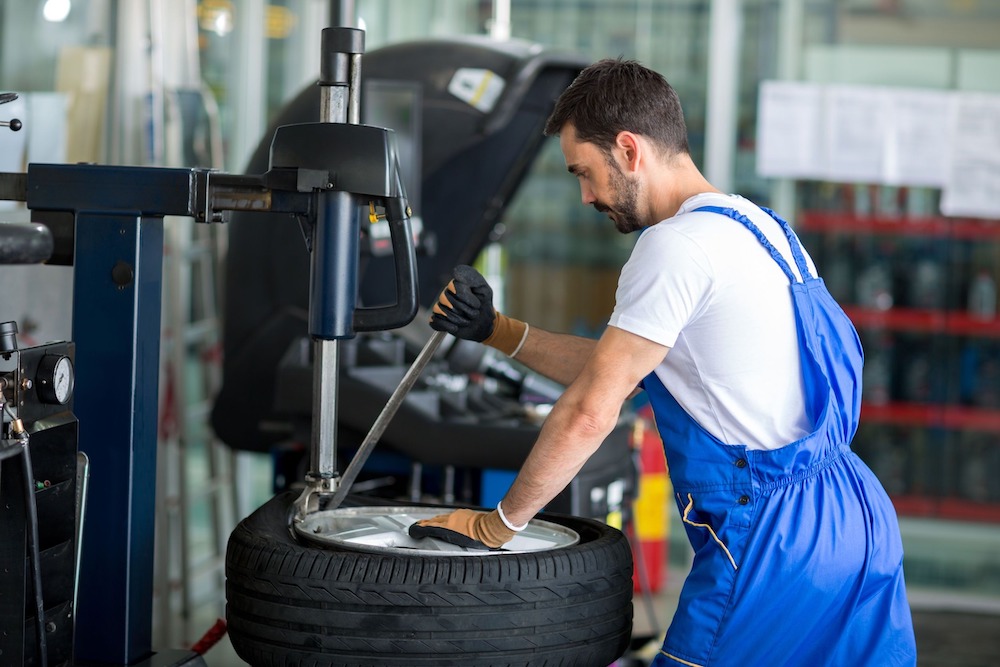
Sharing is caring!
Thanks for your support! If you make a purchase using our links in this article, we may make a commission. And, as an Amazon Associate, I earn from qualifying purchases. See the full disclosure here .
When you first purchase your RV you will have several questions on your mind like Do travel trailer tires and wheels need to be balanced? The answer is yes, you should. Although you may meet RVers and travel trailer owners who disagree, balancing your travel trailer tires is actually necessary for improved performance, tire longevity, and safety factors.
Passenger vehicle tires need to be balanced for ride stability and comfort, as well as for function. Travel trailer tires aren’t balanced to improve the ride for passengers, but they should be properly balanced for a safe towing experience.
Unbalanced travel trailer tires can lead to premature tire and wheel failure, or worse: an accident. As you travel at high rates of speed, an unbalanced tire wobbles which creates an unsafe towing environment.
And to top it off, drivers aren’t likely to feel or notice the wobbling from the cockpit of the tow vehicle. It’s important to have your trailer tires balanced even if you don’t feel like there’s an issue.
In this article we’re taking a closer look at balancing travel trailer tires, answering some FAQ, and more. Let’s get into it.
Should Travel Trailer Tires Be Balanced?
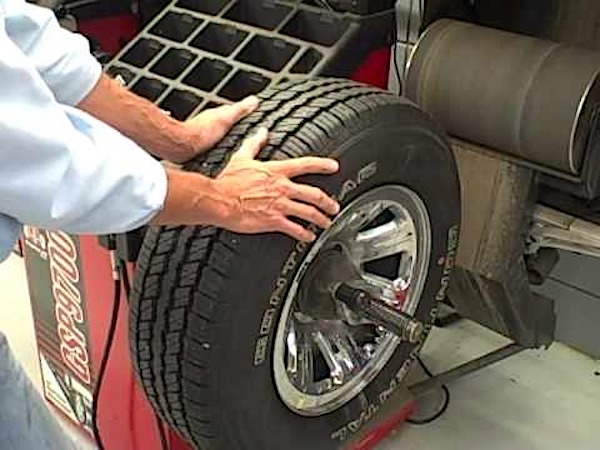
Yes, travel trailer tires should be balanced.
This is a subject that’s really not talked about a lot in the RVing community, nor is it recommended by many people.
And if you ask the vast majority of RV trailer owners if they balance their trailer tires, the answer will probably be “no”.
But we’re here to tell you that: yes, you should have your travel trailer tires balanced.
In an interview done by RV Travel , Wilson Beach, a director with the Tire Industry Association, had this to say:
“Have you ever driven down the freeway and watched a vehicle with an unbalanced tire? The tire can bounce so hard it can actually leave the pavement.”
This bouncing is caused by vibrations and it’s aptly known as “tire hop”.
A balanced travel trailer tire will run smoother, cooler, and increase the overall lifespan of the tire.
Have you ever wondered why some RV travel trailer owners experience blowout after blowout? While blowouts can be caused by many factors, improper tire balance definitely plays a part.
In a passenger vehicle you typically know immediately if your tires need to be balanced. You can feel it in the steering wheel and in the overall ride itself.
However, if you’re pulling an RV trailer, you’re not likely to notice it in your tow vehicle. And RV trailer tires typically don’t come balanced from the manufacturer or dealer, either. Because of these reasons, you need to make sure to have your travel trailer tires balanced yourself.
Do Travel Trailer Wheels Need to Be Balanced?
Just like with your travel trailer tires, you should have the wheels balanced, too.
Improper wheel balance can have a negative impact on your wheel bearings, your axle, and trailer suspension.
Besides the obvious issues of trailer damage and tire blowouts, improper wheel or tire balancing on your travel trailer can damage components inside your trailer, too.
What Are The Consequences of Improperly Balanced Trailer Tires?
There are several potential consequences of improperly balanced trailer tires. Here are few main ones:
- Premature tire wear and tear
- “Tire hop” from excessive vibration
- Wheel bearing failure
- Negative impacts on your trailer axle
- Negative impacts on your trailer suspension
- Damage to components inside your RV
- Trailer tire blowout
As you can see, there are many important reasons to have your trailer tires balanced.
Can I Use Truck Tires on My Trailer?
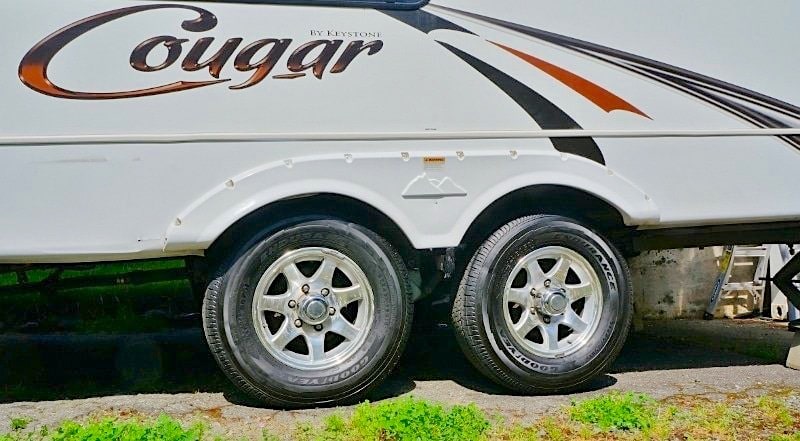
If you are looking to replace the tires on your trailer you will have a few options available to you. You might even think to use truck tires instead of travel trailer tires, but is this a good idea?
Light truck tires are sometimes used in RVs but generally not on utility trailers. Light truck tires are a type of passenger vehicle tire, and as a result, they are not built with a thick sidewall like regular trailer tires. The thicker sidewall helps significantly with the vertical load. So, with that in mind, it is recommended that you use travel trailer tires in most situations.
One of the biggest reasons that a tire can fail is overloading. If you use a truck tire, you are significantly increasing the chances that it will happen. You are towing a lot of weight with your travel trailer and if the tires are not properly rated, they will fail.
Additionally, heat build up can be a significant problem for a lot of people. Thicker tires build up heat when they are not properly inflated. As a result, you need to constantly make sure your tires are inflated correctly when you are pulling a travel trailer. This is why so many RVers use a Tire Pressure Monitoring System like the one we use on our RV.
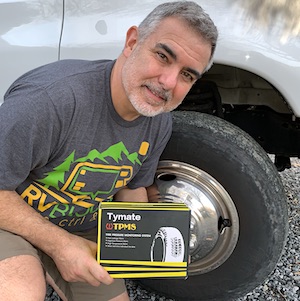
How Long Do Travel Trailer Tires Last?
Age is a major factor when you are determining whether you need to replace your tires. Unfortunately, travel trailer tires undergo a lot more wear and tear than regular passenger vehicle tires. As a result, they need to be replaced more frequently.
Each tire manufacturer will have different recommendations on when to replace their tires. However, the average life span of a trailer tire is around five years under normal maintenance and conditions. That being said, you should start to consider tire replacement after three years. At this time you should consult with an expert and see how your tires are faring.
To increase the lifespan of your tires you can keep an eye out for things that cause tire damage and try to avoid them. Tire damage is often caused by improper tire pressure, excessive exposure to sunlight, improper loading, exposure to high temperatures, improper tire balance, and axle alignment issues. If you can avoid exposing them to these issues, then you can maximize your tire’s life span.
How Often Should You Replace Travel Trailer Tires?
Industry experts recommend replacing your travel trailer tires between three to six years of age.
If you’re unsure how to tell how old your travel trailer tires are, you can find out the age by reading the tire date code printed on the sidewall.
Pro tip: learning how to read tire dates can help you negotiate price when buying a used RV or travel trailer with old tires, even if they look new.
If the travel trailer has been left sitting in the sun for extended periods of time, aim for replacing them every three years or so. Otherwise, the general consensus is about every five years.
Why Do Travel Trailer Tires Blow Out?
As we have mentioned several times already, heat build up can cause a myriad of issues for travel trailer tires. As a result, it should come as no surprise to hear that heat build up is the biggest cause of tire blowouts.
There are many reasons that your tires might get overheated, but the two most common reasons are overloading of the trailer and having underinflated tires.
You should be able to check the trailer axle capacity on a sticker or plate on the frame of your trailer. You should not load your trailer beyond its capacity in any scenario. Additionally, you should make sure that your tires are always inflated to no more than 90%the maximum psi indicated on the tire when the tires are cold.
How Do I Identify Trailer Tires?
When you are looking for travel trailer tires you want to look for an ST or LT rating. ST stands for Special Tire, and LT stands for Light Truck. When you see a tire it should have a label and it will say something like ST 205/75 D14. ST of course stands for special tire, but what does everything else mean?
The 205 refers to the width of the tire in millimeters. Then the 75 refers to the ratio of height to width. In this example, the tire’s height is 75 percent of its width. The smaller the aspect ratio, the wider the tire in relation to height. Finally, the D indicates a bias ply tire and stands for diagonal. If there is an R there instead of a D, it means that it is a radial tire. The number following the letter is the diameter in inches. In this case, the tire is 14 inches in diameter.
Should I Use Radial Tires on My Camper Trailer?
One of the biggest decisions you need to make for your travel trailer is which type of tires to use. Your two main choices are bias and radial tires. Generally, bias tires are less expensive, but they do not perform as well. Trailer owners often say that these tires are flowers because they follow behind the vehicle that pulls them. The vehicle up front does all the work, while the tires just keep the trailer moving.
Conversely, radial tires perform much better. With radial tires your ride will be smoother, the trailer will not bounce as much, and they have a longer shelf life. However, the most important characteristic of these tires is that they can carry a heavy load.
So, should you use radial tires? If money is not a factor then radial tires are certainly the better option. However, finances obviously affect the decision making of most people. As a result, you may need to go with bias tires if you think radial tires are too expensive.
What Are the Best Travel Trailer Tire Brands to Buy?
Here we will look at five of the best travel trailer tire brands available to you. There are so many sellers on the market that is important to narrow things down. Otherwise, you will have a long and grueling search for the best option. However, by looking at these five brands you should be able to find your perfect tires much quicker.
1. Trailer King
Trailer King is one of the best options for people that are looking for new travel trailer tires. Their tries are manufactured to provide a high standard of safety, reliability, and comfort. They deliver everything you might need from an expansive ST Radial size lineup while providing incredible value. Here you should be able to find something that fits any type of trailer.
2. Task Master
Since 2003 Task Master has been making tires for light trucks, trailers, and other towable vehicles. They deliver products that deliver exceptional performance while operating under demanding conditions. Task Master is most known for its travel trailer tires. These products feature a double polyester cord body, double steel belts or full steel sidewalls, and nylon overlays that add extra endurance in tough loading conditions. Additionally, these tires are incredibly strong, making them a great choice for drivers that will be driving off road and in rough conditions.
3. Cooper Roadmaster
Another great brand available to you is Cooper Roadmaster . They sell a variety of tires for many types of vehicles and trailers. The travel trailer tires they sell feature a premium, high scrub tread compound that provides improved treadwear and long lasting protection against cutting and chipping.
Additionally, they have stone ejector ribs in the grooves that help preserve the casing for retreading. Finally, the rounded shoulder design helps minimize the effect of high lateral forces on the tire.
4. Deestone
The final brand we will be looking at is Deestone . They have nine tires available for sale that are designed for trailers. Each of these options is built to reduce rolling resistance. Additionally, you will not need to worry about heat built up with these options. As a result, these tires last longer than many other options available to you.
Prepare for Your Next Trip by Finding the Best Travel Trailer Tires for You
Do travel trailer tires need to be balanced? After reading this article, you should know that our answer is an unequivocal “yes”. In addition to having properly balanced trailer tires, you should also have tires that are capable of handling the load of your travel trailer.
It is generally not a good idea to use truck tires on your trailer as they are not strong enough to handle the weight of a large trailer. As a result, you will want to look for tires that either has an ST or LT rating. These ratings indicate that they can handle at least some trailers.
If you use regular tires you will be at a higher risk of overheating. When this happens your tires might blow out which is the last thing you want to happen. Not only can it be expensive to replace your tires, but if it happens while you are driving it is incredibly dangerous.
Finding the best travel trailer tires for you can be challenging. After all, there are dozens of brands out there, and each of them has several options to choose from. As a result, you should start your search by narrowing the field down to a few brands. Some of the best manufacturers available to you include Trailer King, Task Master, Cooper Roadmaster, Yokohama, and Deestone.
What type of tires are you most interested in purchasing? Have you ever had issues with your travel trailer tires in the past? Where do you plan on going on your next trip? Let us know in the comments!
Related Reading About Travel Trailers
Rv and travel trailer bubble level installation guide, how long does a travel trailer last, do i need towing mirrors for a travel trailer, should i grease my trailer hitch ball or not, 5 best generator mounts for a travel trailer, protecting your travels with rv warranties: what, how, and why.

2 thoughts on “Do Travel Trailer Tires Need to Be Balanced?”
Balanced tires are easier on wheel bearings. I always have mine balanced.
Thanks, Mike for all this important info about RV tires. My wife and I have been taking a trip or two for the past 6 years in our travel trailer, but now we’re selling it and stepping up to a 40′ fifth wheel, selling, giving, and donating most of our belongings, and going full-time RVing! I’m sure the tire info that you’ve provided will prove invaluable to us. Lord bless you and your wife and keep up the good work!
Leave a Comment Cancel reply
Save my name, email, and website in this browser for the next time I comment.

The Savvy Campers
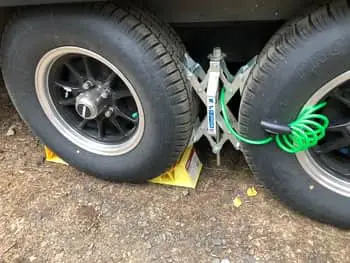
Do You Need to Balance Travel Trailer Tires? Expert Tips and Insights
When planning a trip with your travel trailer, it’s essential to ensure that all components are in good working order, including the tires. Balancing your travel trailer tires is an important aspect of maintaining optimal performance and safety during your travels. This article will discuss the reasons for balancing trailer tires, the potential consequences of neglecting this task, and how to ensure proper balancing.
Travel trailer tires need to be balanced as an unbalanced tire can cause unnecessary vibration, premature wear, and damage to your axle bearings that can lead in failure. An unbalanced tire will cause more heat which can lead to a catastrophic blowout. Most tire dealers have the ability to balance your RV tires.
Balancing travel trailer tires helps to evenly distribute the weight of the trailer, preventing uneven wear, and prolonging tire lifespan. Unbalanced tires can lead to excessive vibration, causing an uncomfortable ride, additional stress on the suspension system, and even accidents. Furthermore, well-balanced tires promote fuel efficiency and a smoother driving experience.
Understanding the importance of balanced tires for your travel trailer is crucial for a safe and enjoyable trip. In the following sections, we will discuss methods for balancing, the signs of unbalanced tires, and when to seek professional assistance. Being proactive in addressing tire balance will contribute to a successful adventure on the road.
You may still be asking yourself if you should balance trailer tires, but let me assure you that you NEED to do this.
Importance of Balancing Travel Trailer Tires
Do you really need to balance your travel trailer tires? The tires on your travel trailer are your lifeline when traveling. The health of your tires is very important, as a blowout could leave you stranded in a remote area.
Tires on vehicles need to be balanced as they are a rotating mass moving at high speeds. A small off balance of weight can change the force that is applied to that one area of the tire causing a tire to vibrate or even bounce at certain speeds. On a travel trailer, this can lead to sway, loss of traction, or the feeling of being uncontrolled.
With a tire bouncing around unbalanced, you may lose traction with the road and cause erratic behavior from your trailer. Also if you lose contact with the road surface, this can enhance sway on your trailer.
Safety and Performance
Properly balancing your travel trailer tires is crucial for ensuring the safety and performance of your RV. Unbalanced tires can cause vibrations, impairing your ability to control the vehicle effectively.
This increases the risk of accidents and can make your journey more challenging. Balanced tires provide better traction on various road conditions and ensure that your wheels are working in unison for a smooth driving experience.
Unbalanced tires can also lead to premature blowouts. Another cause of a blowout can be an unlevel trailer while towing, read about it in our guide here .
Longevity and Fuel Efficiency
Balancing your trailer tires can also contribute to their longevity, as it prevents uneven wear on the tread. When tires are unbalanced, one area of the tire may wear down faster than the rest, leading to a need for earlier replacement. Keeping your tires balanced also improves fuel efficiency, as properly balanced wheels require less energy to rotate.
This means that your travel trailer will consume less fuel, allowing you to save money in the long run.
Comfort and Handling
A smooth ride significantly impacts your comfort when traveling in an RV. When tires are balanced, you will experience fewer vibrations as you drive. This means a more comfortable journey for you and your passengers. Additionally, balanced tires improve handling, making it easier for you to navigate tight turns and maneuver your travel trailer in various situations.
Signs of Unbalanced Tires
Excessive vibrations.
If you experience excessive vibrations while towing your travel trailer, it could be a sign of unbalanced tires. Unbalanced tires can cause noticeable sway and wobble, making it challenging to maintain control of your trailer on the road. Reduced stability can increase the risk of accidents, so it’s vital to address this issue promptly.
Unbalanced tires cause vibration which can rattle rivets, screws, and other items loose on your expensive trailer. Your travel trailer already has enough vibration and earthquake like movement so adding an unbalanced tire can further road damage on the vehicle.
Premature Wear and Tear
Unbalanced tires often lead to uneven wear patterns on your travel trailer tires. This premature wear and tear can result in needing to replace your tires sooner than expected, costing you both time and money. By regularly checking your tires for uneven wear, you can detect unbalanced tires early and take corrective action before the issue escalates.
Damage to Suspension and Components
When your travel trailer tires are unbalanced, it puts additional stress on your trailer’s suspension system and other components. Over time, this extra strain can lead to increased wear and damage to parts such as bearings, axles, and springs.
Keeping your tires properly balanced can help you avoid costly repairs and extend the life of your travel trailer’s components.
Balancing Process and Techniques
Static and dynamic balancing.
To balance your travel trailer tires, you need to understand the differences between static and dynamic balancing. Static balancing ensures the tire remains stationary with no heavy spots when suspended vertically on the axle.
It requires adjusting the tire weight around the center of the bearing to counteract centrifugal force.
Dynamic balancing, on the other hand, involves even distribution of weight around the entire tire circumference. It prevents any side-to-side motion or wobbling while the trailer is in motion, ensuring a smoother ride.
Wheel Weights
Wheel weights are essential tools for achieving proper tire balance. They come in different materials, such as steel, zinc, or lead, and are available in adhesive or clip-on styles. To use wheel weights:
- Identify the heavy spots : Spin the tire and identify the heavy section, which should stop at the bottom.
- Apply the wheel weights : Place the wheel weights opposite the heavy section on the tire’s inner and outer edges, ensuring a uniform distribution of weight.
Professional Tips for Balancing
Here are some professional tips to help you balance your travel trailer tires effectively:
- Check the axle and bearings : Ensure the axle is in good condition and the bearings are properly greased to avoid any balance-related issues.
- Use a tire balancing machine : These machines provide precision and accuracy when measuring tire balance, making it easier to apply the appropriate wheel weights.
- Rotate the tires : Regular tire rotation can help in maintaining even wear, which in turn, keeps balance and handling optimal.
Choosing the Right Trailer Tires
Manufacturer recommendations.
When selecting trailer tires, it’s essential to follow the manufacturer’s recommendations. Trailer tire manufacturers have specific guidelines for size, load capacity, and other properties that ensure the tires support your towing activities. Always check your trailer’s owner’s manual or consult with the manufacturer to confirm the tires meet their standards for safety and performance.
Understanding Tire Ratings and Specifications
In addition to the manufacturer’s recommendations, it’s crucial to understand tire ratings and specifications. These include load capacity, speed rating, and inflation pressure. Load capacity is the maximum weight the tire can support, while speed rating indicates the maximum speed the tire can handle safely. Inflation pressure refers to the appropriate amount of air pressure that should be maintained in the tire for optimal performance.
Consider the following factors when choosing trailer tires:
- Age of the tire : Tires have a lifespan, and it’s generally not recommended to use a tire that’s more than five years old. Look for the “DOT” number on the side of the tire, which provides information on its production date. This will help you avoid purchasing or using aged tires that may not be suitable for safe towing.
- Tire type : Radial or bias-ply tires are commonly used for trailers. Radial tires often provide better heat dissipation and a smoother ride, while bias-ply tires are more durable with stronger sidewalls. Choose the type of tire that meets your specific towing needs and preferences.
- Proper inflation : Maintaining the correct air pressure in your tires is essential to prolong their lifespan and ensure a safe towing experience. Underinflated tires can cause poor handling, reduced fuel efficiency, and increased tire wear. Overinflated tires can cause a harsh ride and uneven tire wear. Always follow the manufacturer’s inflation recommendations.
By following these guidelines and understanding tire ratings and specifications, you can confidently select the right tires for your travel trailer, ensuring safe and enjoyable towing experiences.
Tire Maintenance and Inspection
Regular checks for damage.
Regularly inspect your travel trailer tires for any damages that may have occurred during use. Look for signs of punctures, cracks, or bulges. Excessive heat can cause the rubber to become more susceptible to damage, so pay close attention to your tires after long trips or during hot weather. Examine the tread for uneven wear, which might indicate an issue with your trailer’s alignment.
By promptly addressing these issues, you can prevent a potential tire blowout.
Proper Inflation and Pressure
Maintaining the correct tire pressure is crucial for the lifespan and performance of your travel trailer tires. Over- or under-inflated tires can lead to uneven wear, reduced fuel efficiency, and a greater risk of tire blowout. Check your tire pressure before each trip, using a reliable tire pressure gauge, and adjust the pressure according to the manufacturer’s recommendations. Remember that tire pressure can change due to temperature fluctuations, so make sure to check the pressure when your tires are cool or have not been recently driven.
- Over-inflated tires: May cause a rougher ride, increased wear on the center of the tread, and reduced traction.
- Under-inflated tires: Can lead to increased heat, reduced fuel efficiency, faster tread wear, and a higher risk of blowout.
Monitoring Tire Aging
Even if your tires appear in good condition, it’s essential to monitor their age. Tires degrade naturally over time, and older tires are more prone to blowouts. As a general rule, replace your travel trailer tires every five to seven years, regardless of how they look visually. You can find the tire’s age, indicated by the DOT code on its sidewall. This code reveals the week and year of manufacture, allowing you to determine when it’s time for a replacement. Always check the age of your tires during maintenance and inspections to ensure your travel trailer is safe and roadworthy.
Common Questions
To further assist you, we’ve compiled a list of frequently asked questions and expert answers related to balancing travel trailer tires.
1. How often should I balance my travel trailer tires?
Experts recommend balancing your travel trailer tires every 12,000 to 15,000 miles, or when installing new tires. However, if you experience vibrations or uneven tire wear, it’s essential to get them checked and balanced sooner.
2. Can I balance my travel trailer tires myself?
While it’s possible to balance your tires at home using a portable tire balancer, experts advise seeking professional help for the best results. Tire service centers have specialized equipment and trained technicians who can ensure a precise and accurate balance.
3. Is it necessary to balance all four travel trailer tires at the same time?
Balancing all four tires simultaneously is the best practice. However, if only one tire exhibits signs of uneven wear or vibration issues, you can choose to have it balanced separately. It’s essential to consult with a tire expert to determine the appropriate course of action.
4. What happens if I don’t balance my travel trailer tires?
Neglecting proper tire balancing can result in several issues, such as uneven tire wear, vibrations, poor fuel efficiency, and stress on your vehicle’s suspension components. In the long run, this can lead to costly repairs and decreased tire lifespan.
Remember, whether you are an experienced or first-time travel trailer owner, prioritizing tire balancing is crucial to ensure a safe and comfortable journey.
Travel trailer tires play a crucial role in ensuring a safe and comfortable trip for you and your family. Balancing trailer tires is an essential step in maintaining their longevity and performance . It helps in reducing vibrations, improves fuel efficiency, and ultimately reduces wear and tear on your trailer’s suspension components.
While you might think skipping tire balancing may not cause any significant harm, doing so can jeopardize your safety on the road. Unbalanced tires can lead to accidents due to poor handling, and may also cause uneven and quick wear on your tires.
Regular inspections and routine maintenance are crucial for maintaining your travel trailer tires in optimal condition. By addressing tire issues promptly, you can avoid potential hazards and ensure a smoother, safer journey on your adventures.
Remember that each trailer and tire setup is different; you should always refer to your owner’s manual for specific guidelines on your tire maintenance. When in doubt, don’t hesitate to consult a professional technician to assist you in balancing your trailer tires and addressing any other concerns.
In summary, balancing your travel trailer tires is not a step to be overlooked. By taking the time to ensure your tires are well-balanced, your travels will be safer, more comfortable, and ultimately more enjoyable.
Frequently Asked Questions
Are trailer tires normally balanced.
Yes, trailer tires are generally balanced when you purchase them new. However, over time, the balance can be affected by various factors such as wear and uneven weight distribution. When you notice any symptoms of unbalanced tires or are replacing your tires, it’s a good idea to have them balanced.
Is balancing necessary for single axle trailers?
Balancing is beneficial for single axle trailers , as it can improve the overall performance and increase the lifespan of the tires. Unbalanced single axle trailers can cause uneven tire wear and put additional stress on the trailer’s suspension components.
Should boat trailer tires be balanced?
Yes, boat trailer tires should ideally be balanced. Doing so can help in providing a smoother towing experience and reduces the risk of uneven tire wear, poor handling, and potential damage to the trailer’s components.
How can I tell if my trailer tires are out of balance?
Signs that your trailer tires may be out of balance include uneven tire wear, trailer sway or vibrations at specific speeds, and increased wear on trailer suspension components. If you experience any of these symptoms, consider having your tires inspected and balanced by a professional.
Is tire balancing required for horse trailers?
Balancing tires on a horse trailer is highly recommended. Horse trailers, like any other trailers, can suffer from uneven tire wear and vibrations if the tires are out of balance. Proper tire balancing will ensure a smoother ride, which is ideal for keeping your horses safe and comfortable during transport.
What can happen if I don’t balance my trailer tires?
Not balancing your trailer tires can lead to uneven tire wear, vibrations, poor handling, and increased stress on the trailer’s suspension components. In the long run, unbalanced tires can also decrease the overall lifespan of your tires, resulting in frequent replacements and increased costs.
Do Utility Trailers need to be balanced?
Yes, utility trailers should have their tires balanced for optimal performance. Just like other types of trailers, balancing the tires on a utility trailer can help prevent uneven tire wear, maintain stability, and protect the trailer’s suspension components, ensuring a smooth and safe towing experience.
When tire shopping for your travel trailer, your tire dealer may tell you that trailer tires do not be balanced. This may be true for some lightweight trailers, or utility trailers only used for short amount of times at low speeds, but your travel trailer which runs at high speeds for many miles will be different. Your travel trailer should be keep in the best running shape as possible, which requires its tires to be balanced.
Be the first to be notified about FREE tips, hints, coupon codes, and email-exclusive information. All for FREE!
Related Posts:

Similar Posts

11 Most Important Items To Inspect on a Vintage Travel Trailer Before Purchasing
Ready to hit the open road in style? Shopping for a vintage travel trailer is an exciting way to make that dream come true! But before you commit, it’s essential to do some careful inspection work. You can inspect a vintage travel trailer before purchase by researching the year and model of the trailer and…

What to Look for in a Used Popup Tent Camper
When purchasing a used pop up camper there will be many items to look for, questions to ask, and decisions to be made. This guide should help you determine what unit to buy, if it is a quality unit, and if it is in fact a good deal. When shopping for a tent trailer, there…
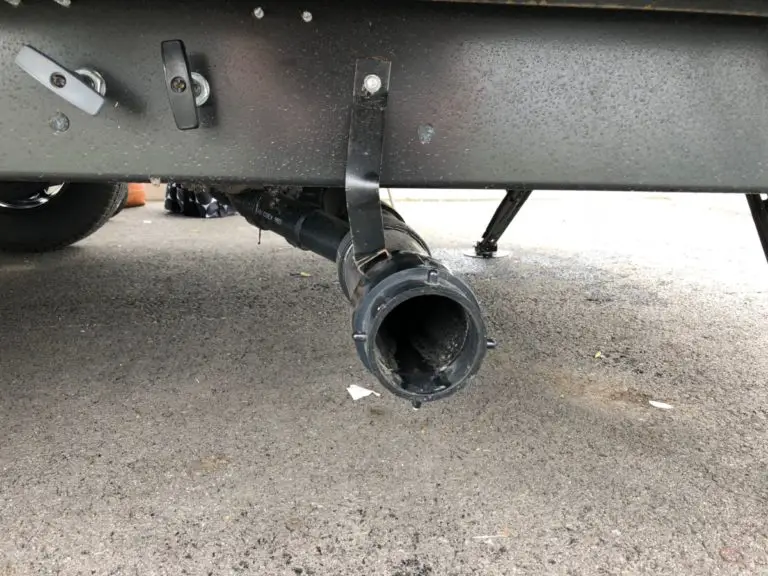
Best Practices when Using an RV Dump Station
Dumping your RV may be one of the least favorite parts of any trip. I know for me, it is a hassle, hate when people are waiting on me, and just don’t like it. After I developed a good system, I am pretty efficient and don’t mind the process. Here is my process below: How…
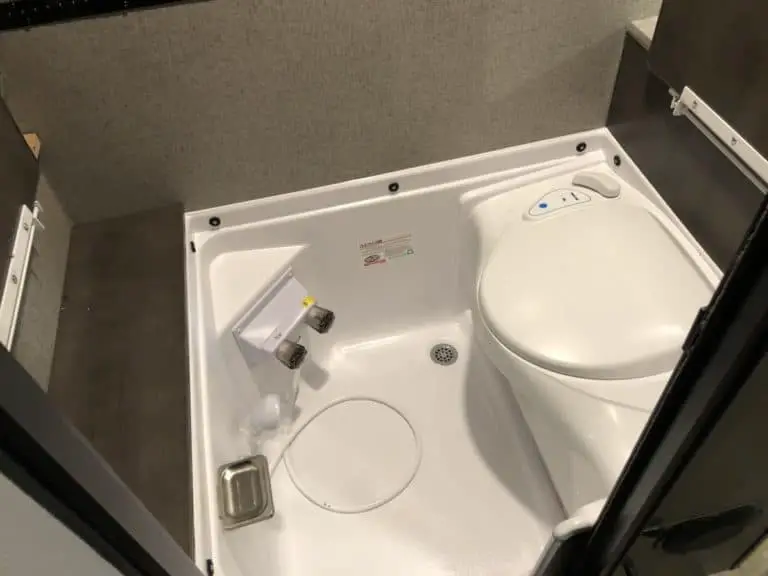
Can you put a regular toilet into an RV?
Whether your home has wheels or not, toilets are, without a doubt, one of the most important pieces of equipment in it. Since they move, RV’s present an even more complicated set of conditions in this department than a house. Can you put a regular toilet into an RV? No, you cannot put a regular…

Here Are The Differences Between Class A, B, and C Motorhomes
When deciding on which motorhome to buy, you need to learn the basics of the different types of classes of motorhomes. We’ll be diving into the pros and cons of each one, but first, you have to answer the following questions. What type of trips you’ll be taking? How big is your family? Have you…
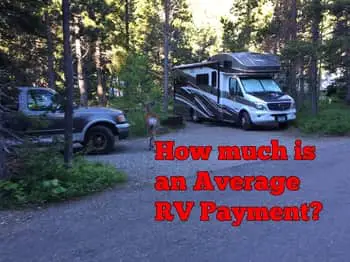
How much is the Average RV Payment? (with examples)
The initial cost of your travel trailer or RV will dictate the majority of what your RV payment will be. Other factors of how much your trailer payment will be are down payment, taxes upon purchase, interest rate on the loan, term of the loan, accessories added, insurance, and licensing/registration costs. Many dealers advertise very…
Join our Newsletter to stay up to date on the latest RV topics and receive our FREE RV Inspection Cheat Sheet Today. Use this tool to inspect new or used campers you are looking at purchasing.
No thanks, I’m not interested!

Do Trailer Tires Need to Be Balanced? Expert Advice Revealed
“Do trailer tires need to be balanced?” is the burning question on the lips of many a trailer enthusiast. As simple as it sounds, the answer can be a game-changer for your travels. Venture into this guide to demystify the balancing act of trailer tires. Learn, adapt, and drive with newfound confidence. Your trailer’s wheels might just thank you for it.
Just like with passenger vehicles, there’s been a long-standing debate on whether trailer tires need to be balanced . As trailers have become more popular for hauling everything from furniture to horses, the question has become even more crucial. With varying views in the market, it’s essential to settle the matter once and for all.
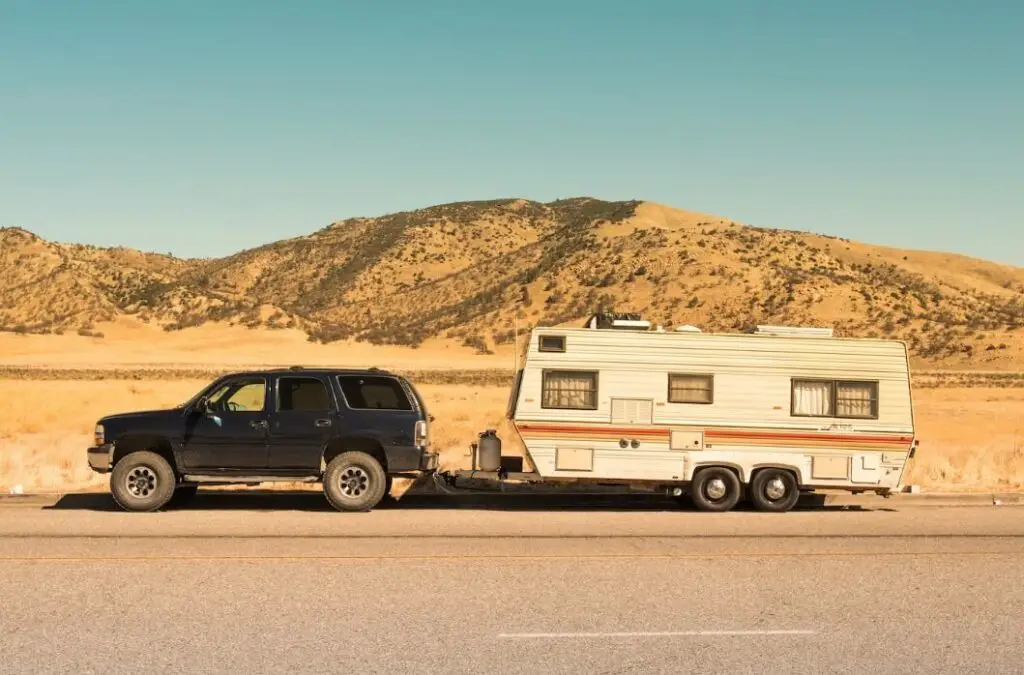
Yes, trailer tires should be balanced. While not every scenario mandates it, balancing these tires can prevent uneven wear, increase their lifespan, and enhance the towing experience. An imbalance can lead to unwanted vibrations and compromise safety. Thus, for optimal performance and safety, experts advise balancing trailer tires.
By diving into the expert perspectives, we hope to provide clarity on this vital topic, ensuring a safer and smoother journey for all your travels.
What is Tire Balancing?
Tire balancing is an essential aspect of vehicle maintenance that plays a pivotal role in ensuring a smooth ride and prolonging the lifespan of your tires. To comprehend its importance, one must first grasp what tire balancing entails and why it’s deemed vital by automotive professionals worldwide.
At its core, tire balancing is the process of ensuring that the weight of the tire is evenly distributed around its axis. This meticulous adjustment ensures that the tire rotates smoothly at high speeds without causing any undue vibrations.
When a tire is imbalanced, certain sections are heavier than others, leading to an uneven distribution of weight. As a result, when the tire rotates, this weight imbalance can cause wobbles or vibrations.
Over time, these vibrations not only result in an uncomfortable ride but can also cause excessive wear and tear on the tire , suspension system, and other critical parts of the vehicle. This uneven wear shortens the tire’s life, leading to more frequent replacements and higher costs in the long run.
Balancing, therefore, not only aims to ensure driver comfort but also plays a crucial role in optimizing tire performance, enhancing safety, and preventing unnecessary expenses.
Why Tire Balancing is Important?
Balancing plays a pivotal role in optimizing the longevity of tires, providing a smoother ride, and preventing premature wear. Properly balanced tires ensure that vehicles operate at their peak efficiency, delivering both safety and comfort for the passengers and the vehicle itself.
Here are five essential reasons that underscore the significance of tire balancing:
- Extended Tire Lifespan: Balanced tires wear out evenly. This even distribution of wear ensures that the tires last longer , saving vehicle owners from frequent tire replacements and additional expenses.
- Improved Fuel Efficiency: Imbalanced tires can lead to increased friction and resistance on the road. Properly balanced tires, on the other hand, maximize fuel efficiency, translating to savings at the pump.
- Enhanced Safety: An imbalanced tire can cause the vehicle to vibrate, potentially leading to a loss of steering precision and control, especially at high speeds. Balancing ensures stable, predictable vehicle handling.
- Reduced Wear on Vehicle Components: Constant vibrations from imbalanced tires put additional stress on the vehicle’s suspension and bearings. Over time, this can lead to premature wear and costly repairs.
- Comfortable Driving Experience: Nobody likes a bumpy ride. Balanced tires minimize vibrations, ensuring a smoother, more comfortable driving experience, especially on long journeys or at high speeds.
Do you know? How to Balance Tires at Home Without Equipment
Differences Between Car Tires and Trailer Tires
Car tires and trailer tires, while both integral to their respective vehicles, serve different functions and, thus, have distinct designs. Their unique roles require different construction methodologies and materials, which can be seen in their performance, wear patterns, and maintenance needs. Recognizing these differences is crucial for optimal tire usage and safety.
Here are some of the most noticeable differences between car tires and trailer tires:
Construction and Purpose
Unlike car tires, which are designed for traction and handling, trailer tires are primarily built to handle loads. This fundamental difference in purpose results in contrasting design philosophies:
- Material and Strength: Trailer tires, often referred to as ST (Special Trailer) tires, are constructed with thicker sidewalls. This robust design helps in bearing heavier loads without bulging, ensuring the tire doesn’t become a weak point when hauling heavy cargo.
- Tread Pattern: While car tires have intricate tread patterns designed for grip, especially during turns or in wet conditions, trailer tires often sport a simpler, straight-line pattern. This design aims to reduce rolling resistance and improve stability under heavy loads.
- Flexibility vs Stability: Car tires need to be flexible to adapt to varying road conditions and to provide a comfortable ride. Trailer tires, on the other hand, prioritize stability over flexibility, ensuring that the trailer remains steady, especially during high-speed travel.
- Heat Dispersion: Considering that trailer tires often bear heavy loads, they’re built to disperse heat more efficiently. Excessive heat can degrade the tire’s integrity, so effective heat management is essential for long-lasting performance.
- Sidewall Design: While car tires might have sidewalls designed for aesthetics or minor performance adjustments, trailer tires possess reinforced sidewalls to counteract the sway or movement that can occur when hauling cargo.
In essence, while car tires focus on delivering a mix of performance, comfort, and safety, trailer tires prioritize stability, load-bearing capacity, and durability, reflecting their core function of hauling loads safely and efficiently.
Wear Patterns
It’s essential to understand that car tires and trailer tires exhibit different wear patterns due to their distinct functions. This distinction arises from the roles they play, their construction, and the stresses they encounter during regular usage.
- Central vs Edge Wear: Car tires, depending on their alignment and inflation, may experience wear on the edges or the center. Misalignment can lead to uneven edge wear, while over-inflation can cause accelerated central wear. Conversely, trailer tires often exhibit central wear primarily due to overloading or over-inflation.
- Flat Spots: Trailers left stationary for prolonged periods, especially when overloaded, may develop flat spots on their tires. In contrast, car tires tend to develop such patterns due to hard braking.
- Scalloping or Cupping: While both types of tires can exhibit scalloping or cupping — a series of dips appearing around the tire’s edge — it’s more prevalent in car tires because of misalignment or worn-out suspension components. Trailer tires might show this pattern due to an imbalance or bearing issues.
- Tread Separation: Because trailer tires bear heavy loads and often remain stationary for extended periods, they are more prone to tread separation. In contrast, car tires, which face regular movement, wear out more uniformly.
Recognizing these wear patterns helps in diagnosing potential issues, ensuring timely maintenance, and optimizing the lifespan of both car and trailer tires.
Must check: 12 Best Boat Trailer Spare Tire Mounts for Safe Towing
Do Trailer Tires Need to Be Balanced?
For years, a key question has lingered in the automotive world: Do trailer tires need balancing? The importance of balancing passenger vehicle tires is well-understood, but there’s a cloud of uncertainty surrounding trailer tires.
Many argue that since trailer tires primarily bear loads, and their primary function isn’t ensuring a smooth drive, the need for balancing isn’t as pronounced. However, others believe that to maximize safety and performance, balancing is crucial.
Yes, trailer tires should be balanced. Proper balancing prevents uneven wear, provides a smoother towing experience, boosts fuel efficiency, and extends the life of the tire. It’s a recommended practice for those aiming for peak performance and safety, even if it’s not always made mandatory.

Given this, while some trailers might come with unbalanced tires straight from the factory, it doesn’t mean balancing should be overlooked. It serves as an essential preventive measure, ensuring the trailer operates efficiently and safely, especially on longer journeys or under heavy loads.
Pros of Balancing Trailer Tires
Those in favor of balancing trailer tires argue that it can lead to a smoother towing experience and longer tire lifespan. It’s not just about immediate benefits but also about long-term savings and efficiency. Let’s dive into some of the main advantages that stem from balancing your trailer tires.
- Enhanced Tire Longevity: Balancing ensures that tires wear evenly. This even wear prevents hotspots and reduces the risk of early tire replacements, thus saving money in the long run.
- Smoother Ride: An unbalanced trailer can lead to vibrations and oscillations. Balancing out the tires helps in minimizing these, ensuring a comfortable journey for both the driver and the cargo.
- Increased Fuel Efficiency: Balanced tires result in a smoother ride, which in turn can enhance the vehicle’s fuel efficiency. This can translate to considerable savings over time.
- Reduced Maintenance Costs: Even wear, and fewer vibrations mean less strain on the trailer’s components. This can cut down on frequent maintenance checks and repairs.
- Improved Safety: Balanced tires offer better road contact, ensuring stable handling, especially when navigating corners or during sudden brakes.
- Optimal Performance: For those seeking the best out of their trailer, balanced tires ensure that the vehicle is operating at its peak, whether it’s carrying light or heavy loads.
Balancing, thus, goes beyond mere comfort. It’s an integral step towards efficient, safe, and economical towing.
Cons and Common Myths About Balancing Trailer Tires
While many experts recommend balancing, there are common myths and misconceptions surrounding the practice of trailer tires. These can lead to confusion, potentially resulting in suboptimal decisions about tire maintenance. Let’s demystify some of the most prevalent misconceptions and also delve into potential downsides associated with tire balancing.
- Added Cost: While balancing does provide numerous benefits, it comes at a price. For those on a tight budget, the additional cost might seem unnecessary, especially if the trailer is used infrequently.
- Time-Consuming: Especially for those with multiple trailers or large fleets, balancing can be time-consuming, taking a chunk out of the workday or delaying trips.
- Balancing is Only for Cars: Some believe that since trailers just carry loads and don’t require smooth rides like cars, they don’t need balanced tires. However, uneven tire wear can affect any vehicle, trailers included.
- All New Tires are Balanced: Some assume new tires are already balanced. In reality, while they might be close, they aren’t necessarily perfect and may still require adjustments.
- Balanced Once, Good Forever: A common misconception is that once tires are balanced, they’re set for life. Tire weight distribution can change with wear, necessitating rebalancing over time.
Understanding the facts and weighing the pros and cons of balancing trailer tires regularly empowers trailer owners to make informed decisions, ensuring they get the most out of their equipment while maintaining safety.
Must see: Why Do People Put Tires on Their Roofs? Discovering the Reasons
Expert Advice and Recommendations on Balancing Trailer Tires
Navigating the landscape of trailer tire maintenance can be tricky, especially when there’s a plethora of information available. Turning to expert advice helps in filtering the noise and understanding what truly matters for the longevity and performance of trailer tires. As one delves deeper, it becomes apparent that context plays a significant role in determining the necessity of balancing.
When Balancing is Critical for Trailer Tires?
While not every scenario requires balancing, certain conditions make it almost imperative for trailer tires. Recognizing these situations can be the difference between a safe journey and potential mishaps:
- New Tire Installation: Whenever you replace old tires with new ones, balancing is crucial. New tires, despite being fresh off the manufacturing line, can have minor weight discrepancies.
- After a Puncture Repair: Once a tire has been repaired, its weight distribution can alter, making rebalancing necessary to restore optimal performance.
- Uneven Wear Indications: If a visual inspection or tire tread depth measurement tool indicates uneven wear, it’s a strong sign that balancing is needed.
- After Long Hauls: Trailers used for long-distance hauling, especially on uneven terrains, may experience changes in tire balance over time.
- Before Critical Trips: If you’re about to embark on a trip that demands optimal trailer performance—be it due to sensitive cargo, challenging routes, or tight schedules—ensuring balanced tires can be vital.
By acknowledging these circumstances and acting proactively, trailer owners can circumvent potential challenges, ensuring their trailers remain in top condition and are ready for the road ahead.
How Often Should Trailer Tires Be Balanced?
Knowing the importance of balancing is just half the story; figuring out the ideal frequency is equally crucial. Trailer tire balancing isn’t a one-size-fits-all solution, as different usage patterns, terrains, and load variations can impact the balancing requirements.
Yes, routine trailer tire balancing is recommended. For most trailer users, experts suggest balancing tires every 10,000 to 12,000 miles or once a year, whichever comes first. However, this can vary based on tire condition and specific usage patterns. Always monitor tires for uneven wear as an indication.
Outside of the routine checks, it’s prudent to balance trailer tires after any tire repairs , after long treks on challenging terrains, or if you notice unusual vibrations while towing. Balancing should also be considered if you change or rotate the tires, ensuring each is optimized for the best possible performance.
DIY vs. Professional Tire Balancing
While many avid DIY enthusiasts may consider balancing their trailer tires at home , there are benefits to seeking professional services. DIY methods, like using beads or fluids, can be effective for some; however, they come with their own set of challenges.
For one, there’s the need for precision – ensuring equal weight distribution isn’t an amateur’s game. Misbalancing can lead to even more severe issues than before.
Professional tire services, on the other hand, utilize specialized equipment that guarantees precise balancing. They also come with the added benefit of an expert’s eye – someone who can spot potential tire issues that might escape the untrained observer.
These professionals can provide guidance on tire health and potential replacements and even offer tips for ensuring optimal longevity.
Lastly, the cost and time invested in procuring DIY tire balancing tools might outweigh the convenience and assurance of getting it done professionally. When it comes to safety and performance, especially on the road, it’s often best to trust the experts.
Key Takeaways: Do Trailer Tires Need Balancing?
The debate over balancing trailer tires can be intricate, but with proper knowledge, making an informed decision becomes clearer. Summarizing our extensive discussion on “ Do you need to balance trailer tires? “, here are the pivotal points to remember:
- Understanding Tire Balancing: At its essence, balancing ensures an even weight distribution around a tire’s axis. It’s a preventative measure against uneven wear and enhances the driving experience.
- Differences in Wear Patterns: Car tires and trailer tires have distinct wear patterns stemming from their unique roles. Recognizing these differences is key to identifying when maintenance is needed.
- The Balancing Debate: While not universally agreed upon, most experts lean towards balancing trailer tires. This ensures a smoother ride, reduces wear, and improves overall tire lifespan.
- Balancing Frequency: Ideally, balance trailer tires every 10,000 to 12,000 miles or annually. However, factors like terrain, tire condition, and usage patterns can necessitate adjustments.
- DIY vs Professional: While DIY methods exist, professional services offer precision and expertise. Specialized equipment and knowledgeable eyes can spot issues, ensuring optimal tire performance and safety.
Navigating the world of trailer tires can be daunting, but equipped with these insights, you’re better poised to make choices that maximize safety and efficiency.
Must check: 13 Best Travel Trailer Tire Pressure Monitoring Systems
FAQs on Do Trailer Tires Need to Be Balanced:
Trailer tire balancing can often raise several questions for owners (such as; do you have to balance trailer tires , do boat trailer tires need to be balanced, signs your trailer tires need to be balanced). To address the most frequent concerns, we’ve compiled answers to some of the common queries below:
Are Trailer Tires Normally Balanced?
Indeed, when you purchase new trailer tires, they typically come balanced. However, as they endure the stresses of the road, it’s natural for imbalances to develop. Factors such as uneven wear, potholes, or even just regular use can affect the tire’s balance. As such, periodic rebalancing becomes essential to maintain optimal performance and safety.
Is Balancing Necessary for Single Axle Trailers?
Single axle trailers might display fewer symptoms of imbalance, like vibrations, but that doesn’t make them immune to the negative effects of imbalance. Balancing is not just about reducing shakes; it’s also about ensuring uniform wear and maximizing tire life. Therefore, even for single-axle trailers, maintaining a balanced tire is a proactive approach to prolong tire longevity and enhance safety.
Should Boat Trailer Tires Be Balanced?
Definitely, boat trailers, by their nature, carry heavy loads. Given the substantial weight of boats and the equipment often stowed on board, it’s crucial to have balanced tires. This ensures not just a smoother ride but also reduces the chances of premature tire wear. Whether cruising to a local lake or on a longer journey to the coast, a balanced boat trailer tire ensures stability, safety, and peace of mind.
How Can I Tell If My Trailer Tires Are Out of Balance?
Detecting an imbalance in trailer tires isn’t always straightforward. However, telltale signs often manifest in uneven wear patterns across the tire’s surface. Additionally, if you notice peculiar vibrations, especially at specific speeds, it might indicate an imbalance. It’s essential to address these symptoms promptly, as ignoring them can lead to accelerated wear and potential safety risks.
Is Tire Balancing Required for Horse Trailers?
Absolutely. Horse trailers carry invaluable and sensitive cargo — the well-being of the animals. Ensuring that the tires are balanced can dramatically improve the ride quality, making journeys more comfortable for the horses. Balanced tires also minimize the potential for sudden tire failures or irregular wear, thereby reducing the risk of on-road incidents and ensuring the animals’ safety.
How Much Does It Cost to Balance Trailer Tires?
Balancing a trailer tire’s cost can vary significantly based on where you are and the chosen service provider. On average, you might expect to pay between $10 to $40 for each tire. It’s advisable to inquire about pricing beforehand and perhaps consider bundling other services, like tire rotation, for a comprehensive maintenance session.
Final Thoughts: Should You Balance Trailer Tires?
The question, “Do trailer tires need to be balanced?” often resonates among vehicle owners. Balancing trailer tires , although sometimes overlooked, is vital for ensuring a smooth journey and enhancing the tire’s lifespan. With trailers playing pivotal roles, from hauling precious cargo to serving recreational purposes, proper tire care is essential.
Yes! Trailer Tires need balancing. Similar to car tires, balancing trailer tires helps evenly distribute their weight, promoting even wear, reducing vibrations, and increasing overall performance. It’s an essential aspect of routine maintenance for a stable and safe ride.
Making a choice to balance trailer tires isn’t just about adhering to best practices; it’s about guaranteeing the safety of every road trip and the longevity of your investment. Knowledge is power. Ensure you’re equipped with the best information to keep your journeys smooth and trouble-free. Safe and balanced travels to all!
You’ll likely appreciate diving into:
- Do Mini Coopers Have Spare Tires? The Surprising Answer!
- How to Remove Paint from Tires: Safe and Effective Techniques
- Why Do My Tires Squeal When I Turn Slowly? An Expert’s Take
- What is a Tire Thumper and Why You Need One?
- Why are F1 Tires Shiny? The Answer Might Surprise You
- Mayflower Tire Changer and Wheel Balancer Combo Review
About Maze Cuban
Hello, I'm Maze Cuban, your go-to expert on winter road safety with snow chains for tires. I share in-depth knowledge about top-notch tire chains, snow tires, and snow socks. I provide detailed guides on tire chain installations and accessories, ensuring your snowy rides are safe and smooth. Journey with me to navigate icy roads with confidence.
Leave a Comment Cancel reply
Save my name, email, and website in this browser for the next time I comment.

OUR MUST-HAVE ITEMS FOR RV'ing
Start your adventure.
We’re reader-supported . When you click on our chosen products, we may receive a commission.
Do Trailer Tires Need to Be Balanced?
Updated on April 16, 2023
Editorial Staff
Reviewed by
Bryan Rainey
Thinking of going tire shopping for your RV? Good for you. While you may be ready to invest in quality trailer tires, one of the biggest concerns on your mind might be whether your RV tires should be balanced.
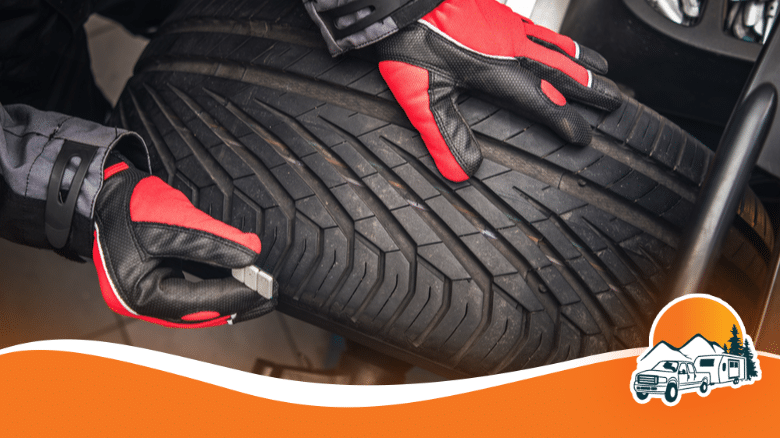
In this article, we will discuss everything you need to know when it comes to balancing your trailer tires.
Yes, trailer tires need to be balanced because it doesn’t only protect the trailer from wear and tear but also ensures its longevity.
Even though the car tires always need to be balanced to ensure the comfort and smoothness of the ride, things are slightly different when it comes to trailers.
You might hear many RV owners or sellers saying that it is not crucial for trailer tires to be balanced. However, when it comes to your trailer, some extra security to ensure its longevity won’t hurt.
Moreover, you’d be surprised to find out that when the trailer tires aren’t balanced, several issues can arise. These issues can potentially compromise the safety of the towing experience of a trailer.
What Happens If a Trailer Tire Isn’t Balanced Correctly?
When the trailer tires aren’t balanced correctly, they may cause several issues. These problems can compromise your trailer’s integrity and cost you in the long run.
Here are a few problems that can arise if your trailer tires aren’t balanced correctly:
Vibration In the Steering Wheel
When the trailer tire wheels are unbalanced, it causes vibration in the steering wheel. This vibration may occur due to damage to the axles of your trailer.
Furthermore, this excessive vibration can cause more extensive damage by loosening the rivets, screws, and other minor yet essential parts of your trailer.
Premature Wear Of Tires
Unbalanced tires in your trailer can cause them to wear and tear prematurely. When the tires are unbalanced, they cause uneven tread on the tire.
This eventually leads to uneven stress distribution on the tires, forcing weaker areas to withstand greater compression.
When less durable areas of the tires withstand chronic stress, they wear out and shorten the life of the tires. Such tires are also at a higher risk of going flat or bursting while you’re traveling. This presents a greater risk of road traffic accidents and potential fatalities.
Damage to Your Axle Bearings
Axle bearings are an important component of a trailer and help maintain wheel alignment and keep it rotating at a normal pace. Unbalanced tires can cause excessive high-speed revolutions of the wheels.
These high-speed revolutions cause an uneven stress distribution on the axle bearings that are helping these wheels rotate. A long-standing pressure on the axle bearings can eventually damage them and affect their function.
Moreover, these high-speed revolutions cause the trailer to hop or move harshly on the road, damaging your vehicle greatly.
Excessive Heating Of Tires
Excessive heating is generally produced due to increased friction between tires and the road. This heating is incredibly damaging to the structural integrity of the tires.
Once the tires’ structural integrity is compromised, the tire’s longevity reduces.
In addition to tire damage, excessive heat production puts pressure on other systems, such as axle bearings. All these problems lead to a reduction in its longevity and a premature breakdown of your trailer.
Damage to Trailer Suspensions
Suspensions are an integral component of your trailer that primarily absorb and decrease the intensity of the shocks from road bumps.
When you drive a trailer with unbalanced tires, the trailer will vibrate excessively. This can damage the trailer suspensions.
These suspensions ensure that your ride is smooth and comfortable. However durable, even these suspensions have a limit for shock absorption, and they can get damaged when unbalanced tires cause your vehicle to vibrate vigorously.
Trailer Tires Would Blowout
As a result of the several effects, such as heating and damage to the axles and suspensions, the trailer tires are likely to get blown out.
The most common cause for tire blowouts is heat production due to underinflation of the tires. But you’ll be surprised to find out that tire blowouts are very common in trailers with unbalanced tires.
This mainly results from imbalanced stress and pressure on the tires, which leads them to expand beyond their limits and eventually get blown out.
Decreased Fuel Efficiency
Unbalanced tires can significantly decrease the fuel efficiency of your trailer. This occurs because the engine undergoes greater stress when you drive with unbalanced tires.
To overcome this stress, the engine has to work harder and requires more fuel to do so. Decreased fuel efficiency means you’ll have to spend a few extra bucks to keep your trailer up and running.
How Do You Know If Your Trailer Tires Aren’t Balanced?
Now that you know the importance of balancing your trailer’s tires, here are a few ways you can help check whether the trailer tires aren’t balanced.
Check For Vibration In the Steering Wheel
The most significant sign of unbalanced trailer tires is unusual steering wheel vibrations. As you drive, you will notice that these vibrations are continuous, and they will tend to get worse as you increase the speed of your vehicle.
Often, the rear tires may be unbalanced. This will extend the vibrations to the car floor and the car seats. This eventually results in a very uncomfortable ride and an overall unsafe towing experience.
Higher Fuel Consumption
Another way to check for an unbalanced tire is to observe the fuel consumption required by your trailer. When a trailer has unbalanced tires, the engine undergoes increased stress.
Your trailer will require more fuel to withstand this stress and work properly. This will affect the overall performance of your trailer’s engine.
3 Ways to Balance Your Trailer Tires
Tire balancing ensures that all your trailer wheels are moving at the same speed. The good news is that you can balance your trailer tires through relatively simple methods.
Mechanical Triangle Spinning
Mechanical triangle spinning is a suitable way to help balance your trailer tires . This method includes attaching the tires to a machine that spins them at very high speeds.
As the tires are spinning, this machine ensures that their spinning rate is the same and they’re rotating simultaneously at an equal pace.
With each rotation, a heavy mass is attached to both tires to observe and then remove any imbalance between them.
Taping Method
In this method, you will start by using a taping tool to determine the imbalance. In the taping method, you should place taping compounds along the tire’s circumference on each side.
If there is a tire imbalance, it would be indicated by a difference in weight on either side. Once the imbalance has been detected, it can be dealt with by adjusting the weights on either side.
Laser Alignment
Laser alignment is a modern technique recently introduced to balance the tires. The tire is spun at very high speeds underneath a laser beam in this method.
This laser beam is able to detect any differences in tire circumference. This process is mainly effective due to centrifugal forces pushing objects away from the midline.
Unbalanced trailer tires can cause a plethora of problems for your trailer. Besides decreasing the longevity of your trailer, they can damage the axles and suspensions and cause premature wear of the trailer tires.
To avoid these problems, you should check if your trailer tires are unbalanced and get them balanced immediately. Keep in mind that if you take good care of your vehicle, it’s gonna take good care of you. Happy traveling!
Popular on Ever RV Right Now!

How Do I Keep Mice Out of My Camper?
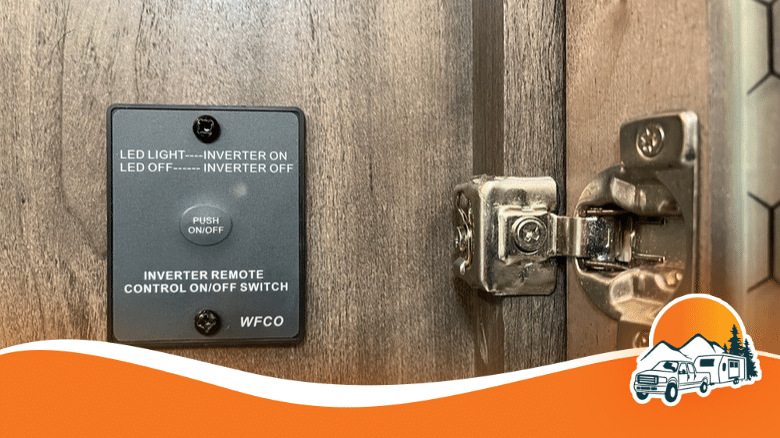
How Big of an Inverter Do I Need For My RV?
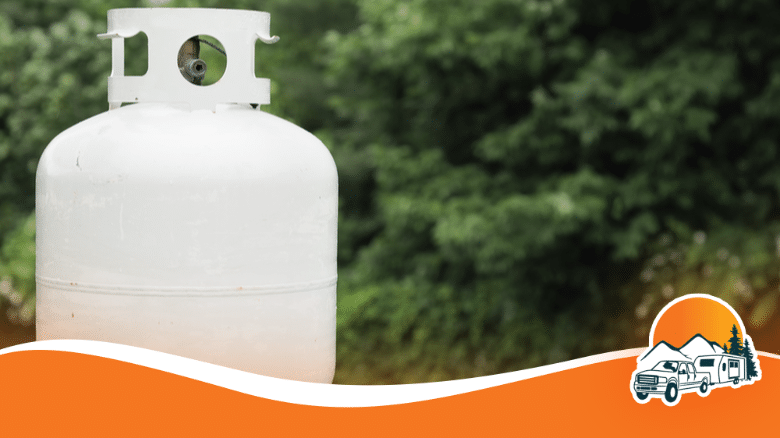
How Long Does Propane Last in an RV? (And Tips to Make Propane Last Longer)
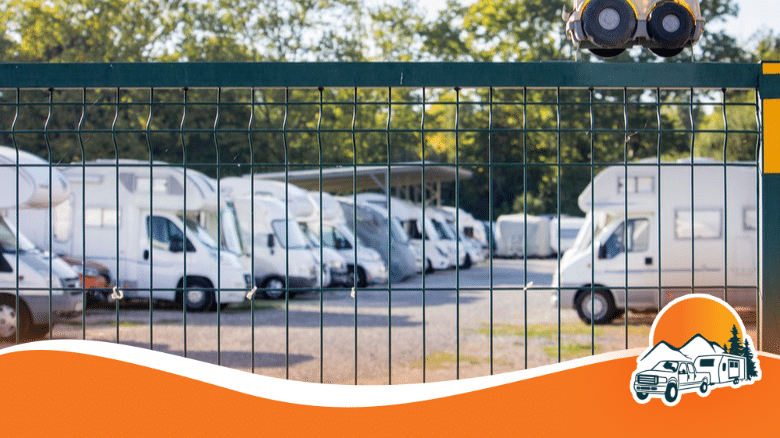
How Much Does it Cost to Store an RV? (Spoiler Alert: Not a Fortune)
Disclosure: Our content is reader-supported . This means if you click on some of our links, then we may earn a commission. See how WPBeginner is funded, why it matters, and how you can support us.
About Editorial Staff
We’re passionate about all things RV and camper, and love sharing tips, “how-to”, and reviewing the latest products to help make your camping experience a success!

The Ultimate
Rv newsletter.
Stay informed about the latest news, tips, and trends in the world of RVing. PLUS receive exclusive offers and discounts on RV-related products and services.
Useful RV Guides
Outdoor griddle vs. grill, rv trends revolutionizing the industry in 2023, how much water pressure is perfect for rvs, gooseneck vs. fifth wheel: everything you need to know, class b motorhome insurance: your ultimate protection guide, how to move a 5th wheel without a truck, when is it too windy to drive an rv.

10130 Mallard Creek Rd, Suite 300 Charlotte, NC 28262 (704) 741-0509
Helpful Links
- Go To Home Page
- RV Guides and Camping
- RV Rental Guide
- About Ever RV
Support Links
- Terms of Service
- Privacy Policy
- FTC Disclosure
Copyright © 2023 Ever RV, All Rights Reserved. | Sitemap
Ever RV c/o EverRV.com is a participant in the Amazon Services LLC Associates Program, an affiliate advertising program designed to provide a means for us to earn fees by linking to Amazon.com and affiliated sites.

- You are here:
- Home »
- Blog »
- » Do Trailer Tires Need To Be Balanced? (Helpful Guide)
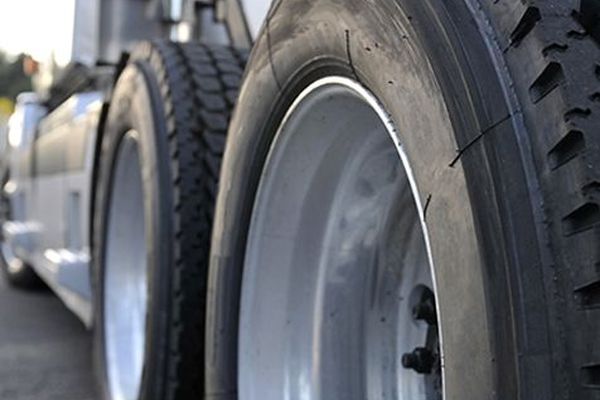
Do Trailer Tires Need To Be Balanced? (Helpful Guide)
- December 27, 2022 /
- By James V.
If it wobbles. That seems to be the rule of thumb when it comes to any tire. If it wobbles, then you should balance it, including trailer tires. Not everyone will agree on this as they will say trailer tires do not need balancing. It is your call whether you do it or not.
Yes, trailer tires should be balanced. Those tires will affect your handling as well as your mpg efficiency. You should have them balanced for safer towing and to get more miles per gallon on every tank full of fuel. The only reason they shouldn’t be balanced is if they do not move very often.
To learn more about this topic, just continue to read our article. It has the information you need to know about before you put those new tires on your trailer. It is possible that your old trailer tires will wear out before you see any ill effects from unbalanced tires.
Do Trailer Tires Need To Be Balanced?
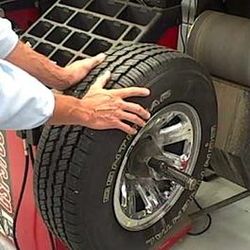
There may be many tire dealers who will say no to this question. They feel that balancing trailer tires is a waste of time and money. However, if they practice the idea that ‘the customer is always right’ and the customer is paying for the balancing, then they should balance them for you.
In some owners’ minds, you do not need to balance your trailer tires, if it is not going to be on the road very often. They feel that the tires will rot away first before you see any negative effects from unbalanced tires.
If that is your situation, then you might want to save some money and not balance them. But if you take your trailer out on the road quite often, then it is better to balance them than not.
You have enough problems with sway and other towing issues and you do not need to add unbalanced tires to that long list of issues you have to deal with. Then the type of trailer you own will dictate if you need to balance your tires or not.
A utility trailer that is used for minor hauling of trash or landscaping materials, etc., should not need its tires balanced. You may not drive fast enough to worry about it.
Finally, this may be a moot point as it has been reported that newer trailers do come with pre-balanced tires.
Do Single-Axle Trailer Tires Need To Be Balanced?
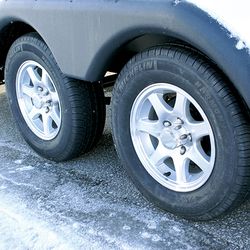
Yes and no. One expert pointed out that if you are using galvanized wheels on your trailer, then the zinc coating is the problem. The zinc coating does not distribute evenly and puts more weight on one part of the wheel than on another.
This situation requires that your trailer have balanced tires or wheels for it to work right. Sometimes, trailer tires and wheel makers line up the light spot on the tire with the heavy spot on the wheel.
This balances your tires to some degree but it may not be perfect or done all the time. The problem is, that many tire centers are not set up to balance trailer tires. That is why they say you do not need it done.
Trailer tires are usually lug-centric while regular tires are hub centric. This difference makes it very hard for some tire centers to balance trailer tires. If they are willing to do it, expect to pay for that additional work to get the equipment ready.
Do Boat Trailer Tires Need To Be Balanced?
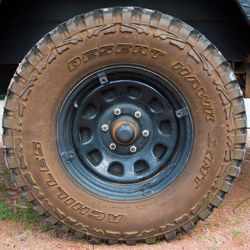
You may get differing opinions on this as well. The main reason why you would balance your boat trailer tires is to keep the ride smooth and to protect your tire from uneven wear.
When they get the latter, they can wear out faster and you will be buying new tires sooner than you want to. There will be people who say differently. Their reasoning is that the weight of the boat keeps the trailer level and there is no need to add more weight to the tires.
If you do see your boat trailer tires wearing unevenly, then check your tire pressure. If they are not the same, then you will get extra wear and tear on the rubber.
Make sure to not under-inflate those tires either. Nor should you over-inflate them. Stick to the psi rating on the side of the tire to make sure they last longer and provide you with a trouble-free ride.
Why Are Trailer Tires Not Balanced?
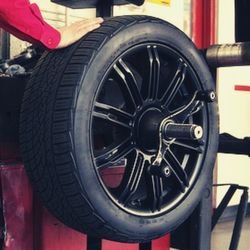
The most common reason is that most tire centers think you do not need to balance them. These tires are just hauling weight and have no steering or other duties so there is less of a need to make sure they are balanced.
However, you should ignore that advice and balance your trailer tires. The reasons you should do so are that unbalanced tires can cause unnecessary vibration, premature wear, and damage to your axle bearings, as well as create too much heat that will cause the tire to blow.
But if you do not tow your trailer that often, it is up to you to balance them or not. Most people do not do this as their trailers sit for a long period of time and are only on the road sparingly.
You will find proponents of both sides of this debate no matter who you talk to. Crawl under your new trailer to see if they have been balanced by the manufacturer.
Some Final Words
Balancing your trailer tires seems to be a good idea. It helps you have a safer journey, and protects against vibration and other possible issues, and towing should be a lot easier if you do it.
But as we said, it is not mandatory for you to do this. If you do not have the budget for balancing your tires or do not want to spend the money, then you can opt out of this option.
We just recommend you do it to be safer.
Related Posts
How Long Do 22.5 Tires Last? (Truck Tire Life Expectancy)
Are Freedom Hauler Tires Any Good? (Trailer Tires Reviews)
Best Tires For E450 Motorhome (Tire Size and Pressure)
Leave a Comment:

A Smooth Ride: Balancing Your Travel Trailer Tires for an Enjoyable Journey
1. introduction.
Travel trailers are a great way to get out and explore the world. Whether you’re looking for a weekend getaway or an extended vacation, a travel trailer can provide you with the freedom and flexibility you need to make your trip memorable. But in order to ensure that your travel trailer is safe and reliable, it’s important to make sure that your tires are properly balanced. In this article, we’ll discuss why do travel trailer tires need to be balanced and how you can do it yourself.
2. What is Tire Balancing?
Tire balancing is the process of ensuring that the weight of the tire and wheel assembly is evenly distributed around its circumference. This helps to reduce vibration, increase fuel efficiency, and improve overall ride quality. When tires are balanced correctly, they will spin smoothly without any wobbling or shaking which can significantly reduce wear on other components such as suspension parts and bearings.
3. Why Do Travel Trailer Tires Need to Be Balanced?
Travel trailers are heavier than regular cars or trucks due to their size and weight of their cargo. As such, they require more stability when driving on uneven surfaces or at higher speeds. Unbalanced tires can cause excessive vibration which can lead to premature tire wear as well as other components such as suspension parts wearing down faster than normal. Additionally, unbalanced tires can cause steering issues due to the uneven weight distribution which can be dangerous if not addressed promptly.
4. Benefits of Tire Balancing for Travel Trailers
When your travel trailer’s tires are properly balanced there are several benefits that come along with it: • Improved handling: Well-balanced tires will provide better handling while driving on uneven surfaces or at higher speeds • Reduced vibration: A smooth ride is paramount when traveling in a travel trailer, so balancing your tires will help reduce vibration which leads to increased comfort levels • Increased fuel efficiency: Properly balanced tires will help reduce drag which leads to improved fuel efficiency • Extended tire life: Balanced tires will last longer than those that aren’t since they won’t experience unnecessary wear from vibrations or uneven weight distribution
5. How to Balance Your Travel Trailer Tires
Balancing your travel trailer’s tires isn’t complicated but does require some basic tools and knowledge about how the process works. You’ll need a few items such as a jack stand, wheel weights, tire pressure gauge, torque wrench and an appropriate balancing machine (if available). The first step is jacking up the vehicle so that all four wheels are off of the ground then removing each tire one at a time using the appropriate torque wrench settings for each lug nut size (this varies depending on make/model). Once removed from the vehicle place them onto the balancing machine (or use an appropriate static balance method) where they’ll be spun until an imbalance has been detected then weights will be added until balance has been achieved before reinstalling them onto the vehicle using proper torque settings again for each lug nut size being used (this also varies depending on make/model).
6. Common Issues Related To Unbalanced Tires On Travel Trailers
Unbalanced tires on travel trailers can lead to several common issues including: • Excessive vibration while driving – this can lead to increased driver fatigue as well as premature wear on other components such as suspension parts • Poor steering response – unbalanced tires can cause steering issues due to uneven weight distribution leading to difficulty controlling direction of travel • Reduced fuel efficiency – unbalanced wheels create drag which reduces fuel economy
7 Tips For Maintaining Properly Balanced Tires On A Travel Trailer
To ensure that your travel trailer’s tires remain properly balanced there are several tips you should follow including: • Regularly check tire pressure – this should be done every month or so depending on how often you use your vehicle; incorrect pressure levels could lead to imbalance issues • Have wheels aligned regularly – this should be done once every 6 months or so by a qualified mechanic; improper alignment could also lead to imbalance issues • Avoid hitting potholes or curbs – these sudden impacts could knock your wheels out of balance leading them needing re-balancing more frequently

8 Conclusion
In conclusion, it’s important for any owner of a travel trailer understand why do travel trailer tires need to be balanced and how they should go about doing it themselves if necessary in order keep their vehicle safe and reliable while out on adventures! Properly balanced wheels not only increase comfort levels but also helps improve fuel efficiency while reducing wear on other components such as suspension parts over time – making it well worth taking care of!
9 Resources
1) https://www.etrailer.com/faq-tire-balancing-travel-trailers#:~:text=Tire%20balancing%20is%20the%20process,drive%20smoothly%20without%20any%20vibration.&text=When%20tires%20are%20properly%20balanced,as%20well%20as%20other%20components. 2) https://www.goodyearrvtireservicesguidebookapplicationsguidebookapplicationsguideline_en_us_v20190830_f1_lr.3) https://www.campingworldrvpartsaccessoriesguidebookapplicationsguidebookapplicationsguideline_en_us_v20190830_f1_lr.
Related posts:
- Securing Your Travel Trailer from the Fury of a Hurricane: A Comprehensive Guide to Tying it Down.
- Discover the Joys of Destination Travel with a Stylish and Functional Trailer!
- Turn Your Travel Trailer Into a Work of Art: Step-by-Step Guide to Painting Like a Pro!
- Uncovering the Costs of a Home Away from Home: Exploring How Much a Travel Trailer Can Set You Back
Leave a Comment Cancel reply
Save my name, email, and website in this browser for the next time I comment.

- Find a Location
Everything You Need to Know About RV Tires and Trailer Tires

Because most motorized and towable RVs are driven less than passenger vehicles, their tires tend to last between three and six years on average. The more you drive, the more frequently you’ll need to replace your tires.
The tread wear is the metric to monitor over your tires’ lifespan. When that tread falls below a depth of 4/32”, it’s time to replace your RV tires. But even if your tires have plenty of tread left, keeping them for more than 8-10 years is not recommended.
Most RV and travel trailer tires should be replaced every 10,000 to 15,000 miles. But each manufacturer recommends a service life for their tires, so it’s best to seek their advice on tire replacement intervals.
RV tire covers can protect your tires from UV exposure, dry rot, and other wear and tear that can shorten your tire’s lifespan. Even if you aren’t driving your recreational vehicle a lot, leaving your tires exposed to the elements will decrease their serviceable life.
How to Change an RV Tire

Blowouts happen, so if you find yourself needing to swap a blown RV tire for a spare, you’ll need the following tools:
- Your RV may or may not have one. They are less common on Class A RVs due to the weight of the vehicle and the dangers of changing a tire on the side of the road.
- If you don’t, call Good Sam Roadside Assistance to get you back on the road.
- DO NOT USE your RV’s built-in hydraulic or stabilizing jacks to lift your RV.
- A lug wrench or torque wrench
- Impact driver with the correct size socket for wheel lugs
- Wheel chocks
- Tire inflator or air compressor with the appropriate fittings
With those tools in hand and your RV parked in a safe location, follow these steps:
- Retrieve your spare tire.
- Place wheel chocks in front and back of tires you aren’t changing to keep your RV from moving.
- Use your lug wrench to loosen all lug nuts holding the tire in place.
- Place the bottle jack under your RV’s frame.
- Extend the bottle jack until the tire is completely off the ground. I f the tire is blown, you need to extend it high enough for the inflated spare tire.
- Use your impact driver and socket to remove wheel lugs.
- Remove the blown tire and set it aside.
- Center the spare tire on the lug threads.
- Replace wheel lugs by hand (at least get them started by hand to avoid cross-threading).
- Initially tighten lug nuts with the impact driver.
- Retract the bottle jack to lower the tire onto the ground.
- Tighten lug nuts entirely with your torque wrench. All manufacturers recommend lug nuts be tightened to a specific torque setting.
- Use your tire gauge to check the pressure in your spare tire.
- If necessary, inflate your tire to the recommended PSI.
- Remove wheel chocks.
- Store the blown tire safely until you find a tire or service center to acquire a new spare.
- Store all your tire-changing tools.
Driving your RV without a spare in tow isn’t recommended. If you’ve had to install a spare, you should replace the original tire as soon as possible before continuing on your RV road trip.
How to Change a Trailer Tire

This process is largely the same for travel trailers . But there are a few additional pointers to remember. Follow the same steps as above, with these safety tips in mind:
- Ensure your trailer’s stability. Even if your trailer is hitched to your tow vehicle, you should place wheel chocks in front and back of the tire(s) you aren’t changing to prevent the trailer from shifting and potentially falling off your bottle jack. You may consider extending your trailer’s stabilizing jacks once your bottle jack is extended. This provides a backup to keep your trailer elevated if the bottle jack fails or slips out of place.
- Inspect the wheel hub after removing the old tire. This should be done for RV and trailer tires. Visually inspect the hub for cracking, buckling, or other signs of damage. If you notice any major signs of damage, contact roadside assistance before moving your RV.
- Find a replacement spare. Don’t travel far without a spare tire for your travel trailer or fifth wheel . Tires for smaller trailers can be harder to come by, but contacting your nearest Camping World Service Center is a good place to start when looking for the best trailer tire providers in your area.
How Much Are RV Tires?

Tire prices fluctuate depending on size, brand, weight capacity, and quality. But the average RV tire costs somewhere between $250 and $300.
Tires for Class A RVs tend to be more expensive than car tires or tires for Class C RVs because they are larger and heavier. Owners of Class B RVs will usually pay less per tire because they require smaller and lighter tires, but your cost may be higher if you decide to invest in higher-quality tires made for off-roading.
How Much Are Trailer Tires?
Most travel trailer tires are smaller than tires for motorized RVs. Their average cost is likely to fall between $100 and $200. But, of course, that cost can fluctuate depending on the exact brand, tire size, load range, tread pattern, and construction you’re looking for.
How to Identify RV and Trailer Tires

Trailer tires are usually identified by an ST or LT rating. ST stands for ‘special trailer tire,’ and LT stands for ‘light truck’ tires These ratings will be at the start of the tire’s label, such as ST 205/75 D14. Here’s a quick breakdown of the rest of that label:
- 205 denotes the tire width measured in millimeters.
- 75 states the tire’s height-to-width ratio (i.e. height = 75% of width in this case).
- D stands for ‘diagonal’ but also denotes a bias ply tire (R would denote a radial tire).
- 14 tells you the tire’s diameter in inches.
Radial or Bias Ply Tires?

Many RV owners don’t know they have options regarding the types of tires for their RV or travel trailer . Radial tires are more common, but bias ply tires are a reasonable alternative for certain uses. Here are some quick definitions:
- Radial tires are built with steel belts inside the tire running at a 90-degree angle to the tread center line.
- Bias ply tires are constructed with nylon belts running at a 30 to 45 degree angle to the tread center line.
The general consensus is that radial tires provide a smoother ride, less trailer bounce and sway, longer tread life, wider footprint, tougher overall construction, and the ability to run cooler.
Bias ply tires are generally less expensive and offer stronger sidewall construction. They also have the advantage when it comes to carrying heavy loads, as they offer a uniform number of plies to support weight in both the tire’s tread and sidewall.
The best tire type for your trailer is indicated on your trailer’s information label (D = bias ply, R = radial). Generally, radial tires are recommended for trailers used regularly for longer trips. Bias ply tires are recommended for tandem axle trailers used for shorter, less frequent trips.
What PSI Should My RV Tires Be?

RV tires have their maximum pressure stated on the tire’s sidewall. This maximum pressure should never be exceeded. That said, the RV manufacturer will usually state the recommended tire pressure for your RV, not necessarily the tire manufacturer.
The RV manufacturer’s recommended tire pressure rating can be found on your vehicle information label or in your owner’s manual. But it’s important to recognize that this pressure rating is for cold tires (i.e., when your RV or travel trailer has been parked for at least three hours).
Should Trailer Tires Be Inflated to Max PSI?

The dangers of over-inflating trailer tires include more difficulty braking and a higher likelihood of tire blowouts. Over-inflated tires also wear out quicker, don’t provide as much traction on wet roads, and can alter your fuel efficiency.
To avoid over-inflating, fill your tires to their recommended pressure when they are cold. As the air temperature inside your tires increases, the pressure also increases.
What to Park RV Tires On

While RV tire covers reduce tire wear and tear, you can keep your tires healthy by parking on friendlier surfaces. Using leveling blocks or tiered tire ramps helps you level your RV right the first time and gets them up off unforgiving terrain.
Your RV’s leveling system also reduces pressure on RV tires when you’re parked. If you’re leaving your RV in long-term storage, follow these tips for maintaining your RV tires while in storage .
Do Trailer Tires Need to be Balanced?

The standard for travel trailer ride quality differs slightly from passenger vehicles. Trailers and fifth wheels are designed to carry cargo and equipment instead of passengers.
That being said, regularly balancing your trailer’s tires can improve performance, increase your tire’s lifespan, and ensure the safety of your trailer and its cargo. Unbalanced tires can create damaging vibrations and premature wear.
They will also heat up more rapidly, increasing the odds of a tire blowout. In the worst case, they can damage your axle bearing, damaging other nearby parts or allowing your wheel to come off when driving at high speeds.
Most trailer manufacturers recommend service intervals for tire balancing, but the industry standard recommends balancing your travel trailer’s tires every 3,000 miles.
What Are the Best RV and Trailer Tires? And Where To Buy RV and Trailer Tires…

Unfortunately, not all RV and trailer tires are created equal. Whether you need to replace blown tires or simply want to buy new RV tires, Camping World is here to help. Our service center locations can assist you in finding and installing the right tires for your RV, travel trailer, or fifth wheel.
Contact Camping World’s Service and Maintenance to discuss your tire needs today.
And when discussing RV and trailer tires with a technician, these are some of the leading brands in the industry:
- Preferred models : XRV and XZE
- Vendor: American Tire Distributors & National Tire Wholesale
- Preferred RV Model: GY G670 RV series
- Preferred Trailer Models: Endurance and LT series – G614 Premium Trailer tire
- Vendor: Goodyear
- Vendor: American Tire Distributors
- Preferred Model: Trailer King tires
- Vendor: National Tire Wholesale
Buying tires from a reputable brand will give you extra peace of mind on your next RV adventure.
Ensuring the health of your RV or trailer tires is critical to your entire coach’s health and the health of your passengers. It will also limit the number of times you find yourself on the side of the road dialing for roadside assistance .
But no matter how much you prepare, the unexpected happens when you’re traveling. Explore Good Sam’s Roadside Assistance , and Extended Service Plans to ensure you’re covered and protected in the event of emergencies on the road.
And if you’re still learning the ins and outs of RV maintenance, check out our downloadable RV ownership and maintenance booklet !
Do you have any additional questions about RV tires or trailer tires? Share them in the comments below!
Leave Your Comment Cancel Reply
Save my name, email, and website in this browser for the next time I comment.
Shop By RV Type

Your Adventure Awaits
Copyright © 2023 cwi, llc all rights reserved.
- RV Glossary |
- Privacy Policy |
- California Privacy Rights |
- Do Not Sell or Share My Personal Information |
- Targeted Advertising Opt Out |
- Terms of Use
8 Best Travel Trailer Tires. Tires for Towing a Travel Trailer or Camper
If you own a travel trailer, having the best travel trailer tires will ensure your trailer is secure and safe when you hit the road. Travel trailer tires are specially designed for use with trailers, so they have a particular tread pattern, ply rating and sidewall thickness that differs from standard car tires.
Travel trailer tires are also constructed from robust materials that are capable of withstanding the pressure they will be under as you haul your trailer. Unlike regular tires, trailer tires have a high load capacity; therefore, they can support your trailer without failing and putting yourself and other drivers at risk.
Clearly, it’s crucial that you choose the right tires travel trailer to ensure the safety of yourself and other road users. But, if you’re new to the world of trailer tires, navigating the range of options can be confusing.
If this sounds like you, don’t worry. In this guide, we have compiled a list of eight of the very best travel trailer tires on the market today, and included a useful buying guide to help you make the right choice.
Table of Contents
- 1.1 Carlisle Radial Trail HD Trailer Tire
- 1.2 Maxxis M8008 ST Radial Trailer Tire
- 1.3 Goodyear Unisteel G614 RST Radial Tire
- 1.4 Goodyear Endurance Radial Tire
- 1.5 Trailer King ST Radial Trailer Tire
- 1.6 eCustomRim Trailer Tire On Rim
- 1.7 Wheels Express Travel Trailer Tires
- 1.8 Grand Ride Trailer Tires
- 2 Compare the Best Travel Trailer Tires
- 3.2 Load Range/Load Rating and Max Weight
- 3.4 Intended Use and Cargo Weight
- 3.5 Durability, Longevity, and Sidewall Strength
- 3.6 Pressure Rating
- 3.7 Speed Rating
- 4.1 Radial Trailer Tires
- 4.2 Bias Trailer Tires
- 5 Top Travel Trailer Tires Video
- 6 Frequently Asked Questions about Travel Trailer Tires
- 7 Final Thoughts
Best Travel Trailer Tires
To save you hours of research, we have selected eight of the best travel trailer tires money can buy. We made sure to choose a variety of options with different load ranges – so there’s something to suit every setup.

Carlisle Radial Trail HD Trailer Tire

Buy from Amazon
First on our list is the Carlisle Radial Trail HD Trailer Tire . This high-quality model is specifically designed for use with travel trailers and fifth wheels. It has a 15-inch rim size and a unique tread pattern.
This improved tread pattern is designed to promote even wear across the tire over time, so you can expect reliable performance as the miles rack up. This ensures your tires last longer, remain stable, and don’t suffer from one overly-worn patch that puts you more at risk of a sudden failure on the road.
As well as this smart tread pattern, the Carlisle Radial Trail HD Trailer Tire has anti-weathering and UV protective properties that defend it from environmental damage all year around. It has also been tested to resist very high road temperatures, so you can drive your rig with confidence in the summer months.
Other great features include low rolling resistance to improve fuel economy, and an impressive 2150 pound load capacity. Thanks to their varied pitch pattern, these tires are quieter on the road than other models, too, so you can enjoy long-haul sections of your journey without an annoying whine in your ears.
With an “M” speed rating, these tires are capable of reaching up to 87mph, which is well in excess of not only the speed limit, but any speed you’re likely to reach while pulling a travel trailer. On the downside, some users have complained that these tires are a little difficult to fit – so if you’re inexperienced, you may have to pay someone else to do this for you.
All in all, the Carlisle Radial Trail HD Trailer Tire is an excellent choice of travel trailer tire for year-around travel. We like how the smart tread design promotes even wear, and the environmental protective properties ensure they can withstand tough conditions without weakening.
Maxxis M8008 ST Radial Trailer Tire

Another great choice of travel trailer tire is the Maxxis M8008 ST Radial . This model is very popular and also has an advanced tread for optimum performance and durability. This tire has a 15-inch rim size and a load capacity of 2830 pounds.
This durable tire boasts a double steel-belted design for strength and increased stability when towing. This feature should put your mind at rest if you’re pulling a large, heavy trailer on a long road trip. Many users have commented that due to these features, this tire is super reliable for extended journeys of 1,000s of miles.
Alongside this strength and stability, the Maxxis M8008 also has an advanced tread design that reduces wear and rolling resistance. This helps to improve your fuel economy and increases the overall life span of the tire, so you can get more use out of it before it requires replacing.
Another useful feature is its shock absorption qualities. If you hit the backroads and are likely to come across some bumpy routes, the integrated shock absorption is well worth having. Every time you hit a bump, the pressure in the tire momentarily increases which puts you at risk of blowouts. It’s not totally foolproof, but this feature allows you to drive over rough patches without gritting your teeth.
This model is one of the pricier options on our list, but considering its durability and reliability, we think it’s a worthwhile investment if you often head out for long-distance trips.
Goodyear Unisteel G614 RST Radial Tire

Coming from a well-known and popular manufacturer – our next pick for the best travel trailer tire is the Goodyear Unisteel G614 RST Radial Tire .
This tire has an established reputation and is easily capable of handling large trailer applications like fifth wheelers. It comes compatible with 16-inch rims and a 75mph speed rating.
Made from heavy-duty rubber, this hard-wearing tire also features a premium enhanced casing for additional toughness. The shallow tread has been specially designed to promote even wear patterns and reduce the running temperatures for increased durability. The shoulder ribs are solid and rounded to provide stability, as well as encourage even wear.
If you tend to hit the road in the summer months or don’t have a nice shaded space to park your trailer, you’ll also appreciate the UV protective qualities. Of course, you should still cover your tires during storage, but it’s good to know that they can handle summer road trips in strong sunshine and high temperatures.
This model provides a single max load of 3,750 pounds, or a dual load limit of 3,415 pounds – making it ideal for weighty applications. We also like that Goodyear offers a free replacement service within either 12 months or the first 2/32″ of treadwear, whatever comes first – another reason to trust the quality of their products.
This model is pretty expensive, but if you need a heavy-duty tire that can handle heavy loads, you can’t go wrong with this tire.
Goodyear Endurance Radial Tire

Another great pick from Goodyear is the Goodyear Endurance Radial Tire . This model fits a 14-inch rim size and has a lower load capacity of 1,700 pounds, so it’s better suited to lighter trailer loads.
The Goodyear Endurance Radial Tire is made from enhanced rubber compound materials for high-strength and durability. It includes a scuff guard to shield the edges of the tire wall from damage if you get too close to the curb, or brush against the undergrowth on narrow roads.
The fabric-steel design of this tire is incredibly rugged, which makes it a good option for long distance trips where the roads could be a little rough. Even though it has all these resilience features, it’s still fully compatible with standard tire inflation stations and pressure monitoring systems, so you shouldn’t have any trouble maintaining them during your journey.
Created for endurance, these tires are resistant to temperature increases and maintain a good, stable tracking when towing. The tread is designed to wear evenly as the miles pass by, so you won’t need to worry about the blowout risk from weak spots developing over time.
This tire may be a little awkward to install if you’re not used to doing it yourself. Thankfully, Goodyear offers a reasonably-priced professional install service, so you can take advantage of this to save yourself the hassle. These tires also come with Goodyear’s free replacement service if the tire fails within 12 months or the first 2/32″ of treadwear – providing peace of mind that you’re covered in the event something unexpected happens.
Trailer King ST Radial Trailer Tire

Next up we have the Trailer King ST Radial Trailer Tire . This durable model is a great choice for RV owners, thanks to its strength, resilience and range of safety features.
One key feature of this travel trailer tire is its center groove. This groove ensures consistent tracking and keeps your tires stable, so you can drive with added peace of mind that your tires are working to keep your setup balanced and secure. The groove also assists with grip in poor weather conditions, which is great if you take trips in your RV all year round.
This model has a load capacity of 2833 pounds, making it ideal for heavy applications. The nylon overlay construction adds extra strength that allows it to easily handle hefty loads without wearing quickly, so it’s a good choice for long distance trips when you’re hauling a lot of weight.
The Trailer King ST Radial Trailer Tire has a more than adequate, “M” speed rating of 81mph. The improved shoulder design also ensures better heat dissipation on the road, so the tread lasts longer while wearing evenly to avoid weak spots. We also appreciate the enhanced tread depth – which helps to reduce rolling resistance and avoid any troublesome heat build up from occurring in the first place.
These tires are great for long haul trips pulling heavy loads, but with constant use under this type of strain, some users found that they failed after a couple years. Considering the reasonable price, though, you’ll be hard-pressed to find an equally robust tire for less.
eCustomRim Trailer Tire On Rim

If you’re looking for highly-affordable, easy-install tires that come complete with rims, then this model is worth checking out. eCustomRim is a well-known name in the States, so you can have confidence in the quality of their products.
This tire has a 15-inch rim diameter, with a 5 Lug 4.5″ center and the 205/75D15 size is compatible with the majority of popular trailer brands – so you shouldn’t have any trouble getting it fitted.
Built for durability, this tire has a 6-ply construction – which puts it in the C category for load range. It has a maximum weight capacity of 1820 pounds per tire, which is suitable for most moderate loads.
If you’re heading out for long drives on the highway, the M speed rating of 81mph is plenty for the needs of RV’ers. It also has good resilience in poor weather conditions, so this tire should keep you stable in heavy rain or snowy roads. The 7.8/32″ tread depth offers good levels of grip and a decent lifespan with regular use.
Overall, these tires are an excellent pick for the price, especially as they come with rims included. They’re well made, fit most types of trailers and cope well in poor weather conditions. We also like that they come with a 5-year warranty, so you can rest-assured you’ll get a good lifespan out of them.
Wheels Express Travel Trailer Tires

Next up we have the Wheels Express Travel Trailer Bias Tire . This 14-inch model comes fully mounted on the rim and ready to fit – so it’s a great option if you’re looking for the full package.
Unlike radial tires, this bias tire has a much stiffer sidewall, which makes it an excellent choice if you’re planning on hitting the backroads where the surface can be a little bumpier. The higher level of rigidity also means this tire is good for stabilizing your trailer and reducing any potential sway that you may experience while towing.
If you often tow heavy applications, this tire is a great match. It has a load range rating of “C”, which means it is capable of supporting loads up to 1820 pounds per tire. It also has a 6 ply construction and is steel belted for better traction and reduced fuel consumption.
We particularly like how convenient this tire is to use. As it comes with a wheel and 4X5 5X4.5 lug pattern, you can go right ahead and install it as soon as you receive it. This saves a lot of time searching for compatible rims and fitting tires separately if you’re starting out with nothing. The price is very reasonable too.
On the downside, if you’re a heavy user pulling hefty loads, this tire may not last as long as other models. Some RV’ers have complained that the tread wore pretty low after a couple thousand miles – so you’ll have to decide if these tires’ qualities fit your intended usage.
Grand Ride Trailer Tires

Last but not least, we have the Grand Ride Trailer Tires . These trailer tires share many of the features we have seen in the other models on our list, but they come in a superb-value pack of four.
This radial tire provides fantastic grip and stability for your trailer to prevent swaying. It also has a max weight capacity of 2150 pounds at 65psi – making it a D-rated tire that’s suitable for heavier applications.
In addition to the reliable grip, this tire has a nylon overlay throughout the tread area, as well as the shoulder area, to protect it and reduce wear. The tire wall also has a special “scuff guard” to ward off damage from those occasional bumps against curbs and rocks.
We were a little disappointed to see that these tires only come with a one year warranty. However, Grand Ride says they have been selling these tires wholesale to trailer manufacturers all across the US, so that’s a good indication that they are of trusted quality.
If you’re looking to get a brand new set of four wheels, keep in mind that unlike the Wheels Express Tires, these don’t come with included rims, so you’ll have to buy them separately if required. That said, considering the price is for four tires, you’re still getting a great deal overall.
Compare the Best Travel Trailer Tires

Buyer’s Guide to Buying the Best Travel Trailer Tires
If you’re unsure which travel trailer tires are the best for your needs, read through our in-depth buying guide below. We explain everything you need to consider before making your purchase.
The best travel trailer tires aren’t cheap, and nor should they be. High-quality tires are crucial to your safety, so this isn’t a time to look for the absolute cheapest option you can find.
The average cost for a good-quality travel trailer tire is around $170. Some tires will cost more, others less, but this is a good benchmark of what you can expect to pay.
Tires from highly-respected brands that have higher load limits and enhanced safety/longevity features can cost twice as much, at around $300. Lesser-known brands that still offer great-quality tires may go for less, at around $80-$130 – although you may find yourself having to replace them more often.
If you have the budget and are planning to do some serious mileage, we recommend opting for the best travel trailer tires you can afford. The biggest brands also tend to offer the most generous warranties, so you can be confident that your tires will last.
Load Range/Load Rating and Max Weight
Before purchasing a trailer tire, it’s critical to check that it has the correct load range/rating to handle your setup. This figure is easy to find on the sidewall of the tire, and will tell you the maximum load that the tire can manage.
The most common load ranges for trailer tires will be categorized under these letters – B, C, D and E. Each letter corresponds to a maximum load range a tire can handle at the recommendation inflation pressure, measured in pounds.
If you had a single axle trailer with C load range tires (max load 1820lbs), you can haul a maximum load of 3640 pounds (2×1820).
However, if you have a double-axle trailer, you must reduce the max load rating by 12% and work on that figure. This means the maximum you could haul with a double-axle trailer would be 3204 pounds.
Clearly, it’s very important to check these figures and be aware exactly how much weight you’re towing before choosing tires for your travel trailer. Making the wrong choice could have dangerous consequences.
The best size travel trailer tire will depend on your trailer. The original tires that came with your trailer will have a size code on their sidewall, which consists of a combination of letters and numbers.
For example, the code “ST205/75R15” tells you a number of things.
First of all, the letters “ST” stand for “special trailer tire”, so you know that this tire is for use with trailers only.
“205” refers to the width of the tread in millimeters, while the following numbers, “75” tell you the height of the sidewall as a percentage of the tread width.
Last of all, the letter “R” means “radial tire” and the number “15” means that it’s made to fit a 15-inch rim.
Not all tires have a code as long as this, though. Smaller tires, (sub 12-inch models) usually have a shorter code. The first number will indicate the width of the tread, while the second number tells you the rim size.
Once you’ve got the hand of deciphering this code, finding the right size tires for your travel trailer will be a walk in the park.
Intended Use and Cargo Weight
Another key consideration before buying new travel trailer tires is your intended use. If you’re only planning to be pulling your small trailer a couple times a year, you’re going to need very different tires from someone hauling a heavy application every weekend.
The same is true when it comes to the routes you usually take. If you usually hit the highways, it’s best to choose a radial tire, as a bias tire is highly unlikely to last under these conditions. On the other hand, if you spend most of your time in the backcountry on bumpy roads, then a bias tire is a better choice. (We’ll explain more about different types of trailer tires later).
Aside from this, you’ll also need to think about the amount of weight you’re going to be hauling. Don’t forget that this is the total weight of your trailer, including everything inside it, too. To be extra safe, it’s best to opt for a set of tires that with a load limit that comfortably exceeds the weight of your rig.
Durability, Longevity, and Sidewall Strength
It should go without saying, but when hauling a trailer, you’re going to want to get a set of tires that have a good level of durability, a decent lifespan, and have high sidewall strength.
You simply don’t want to risk hauling a trailer with low quality tires. This is not only very dangerous for you, but for everyone else on the road too. The best way to ensure you’re getting a high-quality tire is to opt for well-respected brands who have been in the game for a long time and earned their reputation.
Double steel belted tires with additional shoulder scuff guards and nylon overlays are great for strength and durability. Longevity really depends on your usage level, but it’s better to choose a tire with enhanced tread patterns that promote even wear and reduce the risk of isolated weak spots occurring.
Pressure Rating
Tire pressure rating is another top consideration that shouldn’t be overlooked. The stability and safety of your trailer when towing is reliant on your tires being inflated to the correct level of pressure.
If you over-inflate your tires, this will reduce the contact area and result in faster wearing in the center of your tires. If you underinflate them, they’ll wear out more quickly on the shoulders, reduce your fuel economy and are more likely to puncture. As you can see, there’s no good results here – the only way to get the best performance from your tires is to ensure you inflate them to the right level.
You can find out the correct psi level for your trailer load on the side of the tire. This will tell you the required pressure level for the tire to support the load they are rated to. If you don’t inflate the tire to the psi that’s recommended, you cannot be confident that the tire will be able to support the weight capacity as stated.
If you’re changing your load and are unsure what pressure you should inflate your tires to – you can always call the manufacturer or a local tire dealer for advice.
Speed Rating
The speed rating tells you the max speed that a tire can maintain safely over time.
Most travel trailer tires will have a speed rating that is well above the speed you are likely to, (or should be!) reaching when pulling your trailer.
Speed rating is also displayed in a lettering code. A common speed rating you’re likely to come across is “M” – which correlates to 81mph, but you should always double check before buying.
Types of Travel Trailer Tires
There are two main types of travel trailer tire: Radial and Bias. In this section, we take a look at each type alongside their advantages and drawbacks.
Radial Trailer Tires
Radial trailer tires are the most expensive type. They have steel belts inside them that are positioned at a 90-degree angle from the centerline of the tread. This enables radial tires to grip the road better, offers good stability, flexibility and reduces tread wear over time.
These features allow radial tires to remain at cooler temperatures than bias tires. For this reason, radial tires are the better choice if you tend to go on long-haul trips and spend a lot of time on the highway.
The steel belt inside radial tires also means they are less likely to develop flat spots when you leave your trailer parked up for long periods – so they are a great option if you’re planning to store your RV away for the season or pitch up somewhere for an extended time.
Bias Trailer Tires
Bias trailer tires are cheaper, but they are also constructed differently from radial tires.
Bias tires are made with piles that are made with multiple rubber belt plies that are laid at 30-degree angles, overlapping each other. The sidewall is less flexible than radial tires, and as a result, they perform better in off-road environments, so they can be a good choice if you’re mostly out in the backcountry.
The more rigid sidewall of bias tires means that they are also capable of handling a higher load capacity than radial tires, but on the downside, they don’t have a very long lifespan.
Many bias tires fail at around 12,000 miles, so this makes them a less attractive option for travel trailer owners who do a lot of mileage.
Top Travel Trailer Tires Video
Frequently Asked Questions about Travel Trailer Tires
When it comes to travel trailer tires, there are numerous factors to consider to ensure a safe and enjoyable journey. From load capacity and size to tread pattern and durability, choosing the right tires for your travel trailer is essential. To help you navigate through the common queries and concerns surrounding travel trailer tires, we have compiled a list of frequently asked questions. Whether you’re a seasoned RV enthusiast or a first-time traveler, this FAQ section aims to provide clarity and guidance on selecting the best travel trailer tires for your needs. Read on to find answers to your burning questions and gain valuable insights into maintaining and optimizing the performance of your travel trailer tires.
Why are travel trailer tires important?
Travel trailer tires play a crucial role in ensuring a safe and comfortable travel experience. They provide stability, traction, and control while towing your trailer, and they are designed to withstand the unique demands of RV travel.
What are the key factors to consider when choosing travel trailer tires?
When selecting the best travel trailer tires, it’s important to consider factors such as tire size, load capacity, speed rating, tread pattern, durability, and weather performance. It’s also essential to ensure that the tires are suitable for your specific trailer weight and towing requirements.
How often should I replace my travel trailer tires?
The lifespan of travel trailer tires varies depending on factors such as tire quality, usage, and maintenance. As a general guideline, it is recommended to replace travel trailer tires every five to six years, regardless of the tread depth, to prevent potential safety risks.
Can I use regular passenger vehicle tires on my travel trailer?
It is not recommended to use regular passenger vehicle tires on a travel trailer. Travel trailer tires are specifically designed to handle the unique load and towing demands of an RV. They have reinforced sidewalls, stronger construction, and higher load-carrying capacities, which differ from those of regular passenger tires.
What is the proper way to maintain travel trailer tires?
Proper maintenance is essential to ensure the longevity and performance of travel trailer tires. Regularly inspect the tires for signs of wear, maintain proper inflation pressure, rotate the tires as recommended by the manufacturer, and store the trailer in a cool, dry place when not in use. Additionally, keep an eye on the tread depth and consider getting your tires balanced and aligned for optimal performance.
Are there specific tire brands that are recommended for travel trailers?
There are several reputable tire brands known for producing quality travel trailer tires, such as Goodyear, Michelin, BF Goodrich, Carlisle, and Maxxis, among others. However, the best tire brand for your travel trailer may depend on your specific needs, budget, and the type of RV you own.
How can I determine the appropriate tire size for my travel trailer?
To determine the correct tire size for your travel trailer, you can refer to the information provided by the trailer manufacturer, consult the owner’s manual, or check the existing tires on your RV. The tire size is typically indicated by a series of numbers and letters on the sidewall, such as “ST225/75R15,” where “ST” indicates a special trailer tire.
Can I replace just one tire, or should I replace all of them at the same time?
Ideally, it is recommended to replace all travel trailer tires at the same time. This helps maintain even tread wear, ensures balanced performance, and minimizes the risk of tire failure. However, if only one tire needs replacement due to damage or wear, it is essential to choose a tire with the same specifications as the existing ones to maintain proper load capacity and compatibility.
Are there any specific considerations for travel trailer tires in different weather conditions?
Travel trailer tires should be suitable for the weather conditions you expect to encounter during your travels. In colder climates, consider tires with a winter or all-season rating, as they provide better traction on icy or snowy roads. In hotter climates, choose tires that can handle high temperatures without compromising performance or durability.
Can I install the tires on my travel trailer myself, or should I have them professionally installed?
While it is possible to install travel trailer tires yourself, it is recommended to have them professionally installed to ensure proper mounting, balancing, and alignment. Professional tire installation can also help identify any underlying issues and provide expert advice on tire maintenance and care.
Remember, selecting the right travel trailer tires is essential for your safety and the overall performance of your RV. Consult with tire experts, read reviews, and consider your specific needs before making a decision.
Final Thoughts
Choosing the best travel trailer tire for your needs is not only crucial for the safety of yourself and other road users, it can also improve trailer stability and save you money in the long term.
The right option for you is dependent on your trailer, but if you haul a heavy load, then the Goodyear Unisteel G614 RST Radial Tire could be your best bet. This model is made from heavy-duty rubber that’s highly durable and has an impressive load range of 3,750 pounds per tire. The tread is specially designed to wear down evenly to prevent weak spots from occurring, and the shoulders are rounded to provide stability.
For more mid-range loads, then either the Maxxis M8008 ST Radial Trailer Tire or the Trailer King ST Radial Trailer Tire are worth a look. These models have load ratings of 2,830 pounds and 2,833 pounds respectively, offer great durability and an advanced tread design for optimum performance.
Alternatively, if you pull lighter loads, then the Goodyear Endurance Radial Tire could be right for you. This tire can handle 1,700 pounds, has a rugged fabric-steel design which is great for long distance trips, and has scuff guards to protect against accidental damage.
About The Author
Karan Riley

No products in the cart.

Should You Balance and Rotate Your RV Tires?
NOTE*** The content on this page may contain affiliate links, we may make a commission. And, as an Amazon Associate, we earn from qualifying purchases. More information: disclosure page .
If you’re new to RV living, one of the questions that you may be wondering is how to care for your RV tires. How often should you balance and rotate RV tires?
RV and motorhome tires should be balanced when they are replaced and checked frequently for uneven wear. RV experts generally agree that RV and trailer tires are unlikely to see enough miles to need to be rotated. However, you can rotate them when you see uneven wear or about 8,000 miles.
Some very diligent RVers inspect and rotate their trailer tires at the end of every season. I have replaced a full set of trailer tires a couple of times and it is not a cheap thing to do. So it’s worth trying to extend the life of your RV tires.
However, it continuously varies in different circumstances how to care for your tires. But hold your horses because we will help you answer your questions to prepare you for your next trip!
Before we start, you may want to check these blogs that have more RV driving tips for you:
- Driving an RV in the Snow: The Ultimate Safety Guide
- 15 Expert Tips: How To Drive An RV In High Winds
Should I Get My RV Tires Rotated?
Most experts agree that if you are using your RV for seasonal vacations, that your tires will need to be replaced due to age before needing to be rotated. However, rotating your tires, especially if they are prone to uneven wear, will help the tires last longer .
Tires are crucial elements of your RV’s base, and you need to keep in mind that RV tires are created differently in terms of structure, form, and function.
Many individuals believe that rotating the tires isn’t essential unless there is abnormal deterioration.
On the other hand, rotating tires can assist in minimizing uneven wear over time and extend the life of the tires.
When to Know If My Tires Need Rotation?

Tire rotation isn’t something you need to do every month, especially if you do not travel that much. For example, with seasonal camping, your tires are likely to succumb to age deterioration before they have good consistent use to need a rotation.
But the question is, when will you know if you need to rotate your tires?
You need to keep an eye out for a few indicators that may signal that your RV tires need to be rotated or replaced.
Inspect your tires regularly. To begin with, check for odd wearing patterns over the tires as they might cause dips in your tire tread.
Moreover, feel for feathering by running your hands across the tread’s breadth. If they only flow in one way, it may indicate misalignment, which will need you to rotate the tire to level out the wear.
Rotating your tires when there is not a problem could actually cause damage if done improperly. Seek professional help first if you notice unusual signs so that they can tell whether your tires need rotated or any other services.
How Often Should Your Rotate RV Tires?
Experts recommend rotating RV tires when you see uneven wear or when you reach 6,000 to 9,000 miles. However, most people will need to replace the tires to due age before this. But if you do drive many miles, it helps to extend tire life and better performance while on the road.
Some RVers make it a habit to rotate their tires at the end of every season.
You must, however, follow a specific pattern while rotating the RV tires.
Overall, tire maintenance will help keep your RV comfortable to drive, and reliable throughout its life.
Is It Possible to Personally Rotate My Tires?

RV tire rotations can be done personally and at home. Although you should think about the time and expertise needed to do this. Remember that it will require a lot of effort and patience throughout the process. If it is not done correctly you could cause more problems.
You need to be able to access beneath the RV with your equipment such as an air-powered impact wrench, jack stands, and hand wrenches. You’ll need to jack up your RV to get the weight off the tires and remove them.
If you do not have the time and equipment to do these things, you can always ask for professional services and easier maintenance but expect some costs that will depend on where you brought your RV and what type of tires you have.
Is It Possible for Rotating Tires to Affect Alignment?
There are several topics of discussion when we talk about tire rotation. Many people believe that RV tires should be rotated by the owner once a season, but many also say that they should not be rotated because it might cause further damage.
Both ideas have some validity because improper tire rotation can affect alignment, especially if the RV has had significant suspension difficulties. However, if you are able to properly follow the rotation pattern you shouldn’t be concerned.
If you are still worried, it is best just to bring it to a tire rotation service.
What Happens if I don’t Rotate my RV Tires?
RV tires likely age out before they wear out. Tires that are on an RV won’t generally get enough use before they age.
Many, many RVers never rotate their tires on their motorhome or travel trailer. So likely nothing will happen, if you camp near home and your RV is aligned and driving well.
If you travel long distances you may find wearing patterns in the treads.
Your RV treads may wear out if you don’t rotate them regularly, resulting in a critical incident and unsteady driving condition.
Moreover, tire tread degradation can compromise a driver’s safety on the road and increase accidents which I know you do not want to experience.
How Often Should I Get My RV Tires Balanced?
As a general rule, tires should be balanced when they are replaced on an RV. Theoretically, the tires should remain balanced, but if you notice unusual vibrations or wear, you can have the RV tires balanced as needed.
In an RV, balancing your tires is a significant step because it allows the tires to grip the road during turns and to sustain the vertical load. RV tires are constructed differently than regular automobile tires since they must carry significantly greater weight.
You should be aware that vibrations from the imbalanced tires are a distinct possibility. In some instances, the tires can break or collapse.
Why Should I Get My RV Tires Balanced?
When traveling, maintaining your RV tire’s condition is critical, as a blowout can be very serious. A tiny shift in weight can vary the force given to that one part of the tire at certain speeds, causing it to wobble or feel out of control.
Unbalanced tires have more rubber on one side and metal on the other. The process of balancing a tire aims to add weight on the different sides to compensate for the imbalanced rubber and metal.
Do not worry because this process will not take too much time, especially when done by professionals.
How Can I Balance My Own Tires?
You cannot balance your own tires. Tires must be balanced at the dealers because they have those machines and equipment that are used for balancing tires.
If they do not have it, you can look for it at other tire dealers near you because it is for your safety.
Effects of Unbalanced RV Tires
An imbalanced tire generates extra heat, resulting in a lesser lifespan and perhaps a blowout.
Apart from creating extra heat, it may also produce vibrations that can loosen tire parts and may cause the wheels to have difficulties in spinning. Over a period of time, this will cause problems with your RV.
How Make RV Tires Last Longer
RV tires are expensive and you may have 4 or 6 or more. They are subjected to significant wear and tear and need to be regularly checked and replaced if needed.
When it comes to tire replacement, each tire brand has its own guidelines. Under some circumstances and regular checkups, which evaluate your tire conditions, the average RV tire lifespan is around five years.
To prolong the lifespan of your tires, you should be vigilant to certain things that may cause their early deterioration and blowout. Here is how to make your RV tires last longer
- Do not overload your RV
- Carefully distribute and balance your load
- Ensure the correct tire pressure
- Do not store or park longer than 6 months
- Cover your tires in RV storage
- Inspect your tires regularly for damage or uneven wear
- Check the sidewalls for damage
- Avoid extreme temperatures
- Rotate as necessary
- Replace tires when needed
The tire’s lifespan is still dependent on how much you use them and the maintenance you provide them.
Best Tires for RVs:

Final Thoughts on Balancing and Rotating your RV Tires
To sum it up, your tires do need to be balanced when you replace them. They will ride more smoothly if they are, you don’t need to do it frequently. You do need to rotate them through though.
Another thing to remember is that you can do both of these by yourself, but it can be tricky especially for those who are not familiar. If possible, getting help from professionals to have anything done with your RV is always the best bet.
For more helpful RV Tips, check out these blogs:
- RV Keeps Tripping The Breaker? Here’s What to Do!
- How to Replace an RV Door
- How Long Do RV Rubber Roofs Last? (Plus 7 Maintenance Tips!)
Get this 19-page Travel Planner that I personally use for our family trips
We respect your privacy. Unsubscribe at anytime.

Hi, I’m Shauna – Welcome to Family Travel Fever. We are a large family, that was bitten by the travel bug! I take the kids by myself because I don’t mind flying or driving solo with my crew to discover the coolest places.
Sign up for our email list for my best travel tips plus get the family travel planner free.
Similar Posts

Where to Empty RV Waste Tanks? (cost & instructions)
Learn where to empty your RV waste tanks, how much it will cost and how to empty and flush the black water tank. This is critical information for traveling in an RV.

RV Electric Setup Basics (RV Plugs and Voltages)
Electrical systems may leave your head spinning, but this article explains it simply. Get to know your RV electrical setup basics to understand your RV and to avoid electric problems.

Ever Wonder What Happens to RVs That Don’t Sell?
RVs get manufactured everyday and dealers always have their promos and sales. But have you ever wondered what happens to RVs that don’t sell?

11 Smart Pop-up Camper Gray Water Tank Ideas
So what should you do with the gray water in a pop-up? We show you some pretty smart ideas to handle gray water in a pop-up camper. You can solve your problems by following any one of these pop-up gray water hacks.

How To Set Up an RV For Permanent Location Use
Dreaming of setting up camp for permanent use and living in your RV? We did it and show you how. Don’t miss all the great tips we have to keep you from getting overwhelmed.
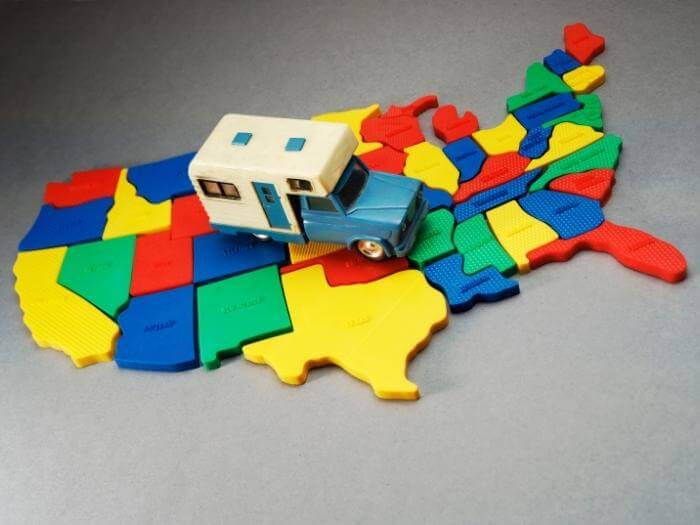
What Driving License Do I Need to Drive an RV in the USA?
Thinking about driving and RV in the US? Make sure you have to correct license to drive and RV and that you are following the rules in each state for driving.
Leave a Reply Cancel reply
Your email address will not be published. Required fields are marked *
This site uses Akismet to reduce spam. Learn how your comment data is processed .

How to balance Trailer Tires? 5 easy steps
Have you ever been excited for a trip with your trailer, but then the ride starts to feel bumpy and not smooth? That happened to me last year. I was in the middle of a fun road trip when my trailer began to shake. I started worrying about How to balance Trailer Tires. Before this, I didn’t think much about tire balance, but now I know it’s really important.
I learned that unbalanced tires can cause a lot of problems. They can lead to uneven wear, reduce fuel efficiency, and even make towing unsafe. This is especially true for trailers. Ensuring your trailer tires are balanced is crucial for a smoother ride and longer tire life. And when it comes to the best trailer tires, balancing them properly is key.
So, you might wonder, ‘How to balance Trailer Tires?’ It might sound like a task for the pros, but trust me, it’s simpler than it appears. Stick with me as I will share easy-to-follow steps that ensure your trailer tires are perfectly balanced. Taking a little time to do this can save you from trouble later and make your trip much safer.
How to balance Trailer Tires
Unbalanced tires aren’t just a minor inconvenience. They spell trouble with a capital T, leading to rapid wear, plummeting fuel efficiency, and a safety hazard for you and your precious cargo. Particularly for trailers, keeping those tires balanced is not just maintenance; it’s a necessity for a smooth journey and extending the life of your tires.
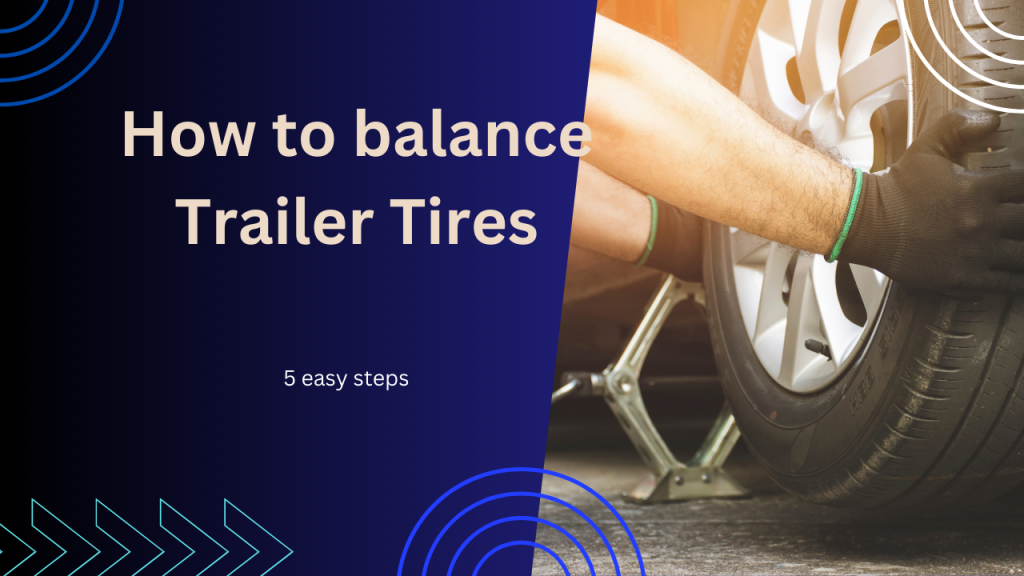
5 steps to Understand Tire Balancing
Tire balancing for trailers is about ensuring the weight is evenly distributed around each wheel. If the tires are not balanced, the trailer can start shaking or bouncing while you’re driving. This not only makes the ride uncomfortable but can also speed up tire wear and make it harder to control the trailer. Balanced tires help in avoiding these problems, ensuring a smoother and safer journey.in these steps we will learn about “How to balance Trailer Tires”.
1.Signs Your Tires Need Balancing
You might notice that your trailer tires need balancing if:
- You feel shaking or vibrations in the trailer, especially at certain speeds.
- The tires seem to wear down unevenly or faster than they should. It’s wise to check the balance of your tires regularly, particularly before embarking on long trips. This can prevent unexpected issues and ensure a comfortable ride.
2.Getting the Right Equipment
For balancing your trailer tires, you will need a tire balancer. This tool helps identify which part of the tire is heavier or lighter by spinning the tire and wheel. Based on this, you can adjust the weight distribution. Tire balancers are available at automotive shops or online. Choose one that’s suitable for trailer tires and easy to use.
learn About That: Can Trailer Tires Be Used On A Car
3.Adding the Weights
Using the balancer, you’ll find the tire’s light areas. Then, you attach small weights to the opposite side to even out the distribution. This process requires precision and patience to get right. Ensuring the weight is perfectly balanced around the tire eliminates vibrations and improves tire longevity.
4.Test After Balancing
After attaching the weights, it’s crucial to test the tire on the balancer again. This confirms that the tire is now balanced. If it’s not perfectly balanced, you may need to adjust the weights slightly. A properly balanced tire will offer a noticeably smoother ride, reducing stress on the trailer and increasing safety.
5.Regular Checks
Regularly checking your trailer tires’ balance is key to maintaining them. Balanced tires wear more evenly, extending their life and ensuring consistent fuel efficiency. It’s recommended to check the balance:
- Every time you get new tires installed.
- After any tire repair.
- At least once a year if you use your trailer frequently.
- Before long trips or when you notice any signs of imbalance.
Additional Tips
- Understand Weight Limits: Always be aware of your trailer and tire weight limits to avoid overloading, which can also affect tire balance.
- Monitor Tire Pressure: Keeping your tires properly inflated is crucial alongside balancing for optimal performance and safety.
- Professional Help: If you’re unsure about balancing tires yourself, consider getting help from a professional. They have the expertise and equipment to ensure your trailer tires are perfectly balanced.
Balancing trailer tires is really important for safe driving. When the tires are balanced, the trailer moves smoothly. This means less worry about things going wrong on the road. It’s a simple thing, but it makes a big difference.
Balanced tires also mean they last longer. This saves money because you don’t have to replace them as often. And, a smooth ride means less strain on the trailer and the vehicle pulling it. So, it’s good for everything.
In the end, we will learn “How to balance Trailer Tires” which is taking a little time to balance your tires can help a lot. It keeps you and your trailer safe and saves money in the long run. Remember, well-balanced tires are a key part of keeping your trailer in top shape.
Why is balancing trailer tires important?
Balancing trailer tires is important for a smooth ride and safety. It prevents uneven tire wear, reduces vibrations, and extends tire life. Proper balance also improves fuel efficiency and reduces strain on the trailer.
How often should I balance my trailer tires?
It’s good to balance your trailer tires at least once a year or whenever you get new tires. Also, balance them if you feel unusual vibrations or notice uneven tire wear.
Can I balance trailer tires myself?
Yes, you can balance trailer tires yourself with the right tools and knowledge. You’ll need a tire balancer and balancing weights. However, if you’re not comfortable doing it, a professional can do it for you.
What are the signs of unbalanced trailer tires?
Signs include vibrations in the trailer, uneven tire wear, and the trailer pulling to one side. If you notice any of these, it’s time to check the balance of your tires.
Similar Posts
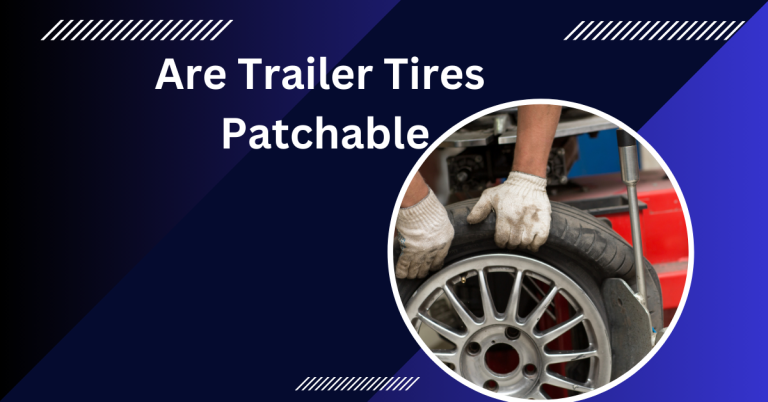
Are Trailer Tires Patchable? Helpful guide
Have you ever been in a situation where you’re on an important trip, and suddenly, one of your trailer…
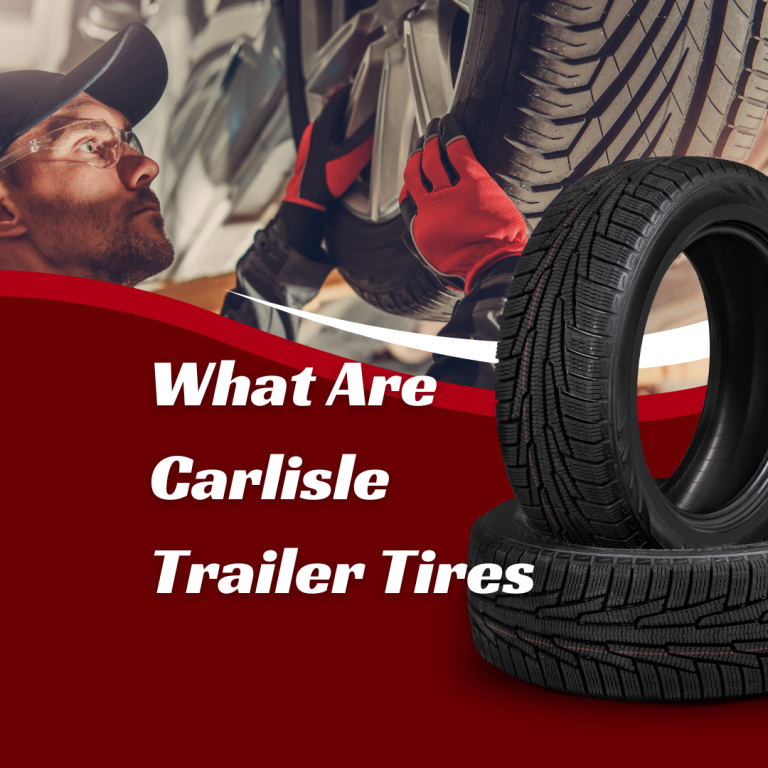
What Are Carlisle Trailer Tires? Complete Guide | Trustworthy
Have you ever heard about Carlisle trailer tires? If not, you’re in for a treat. You might be wondering,…
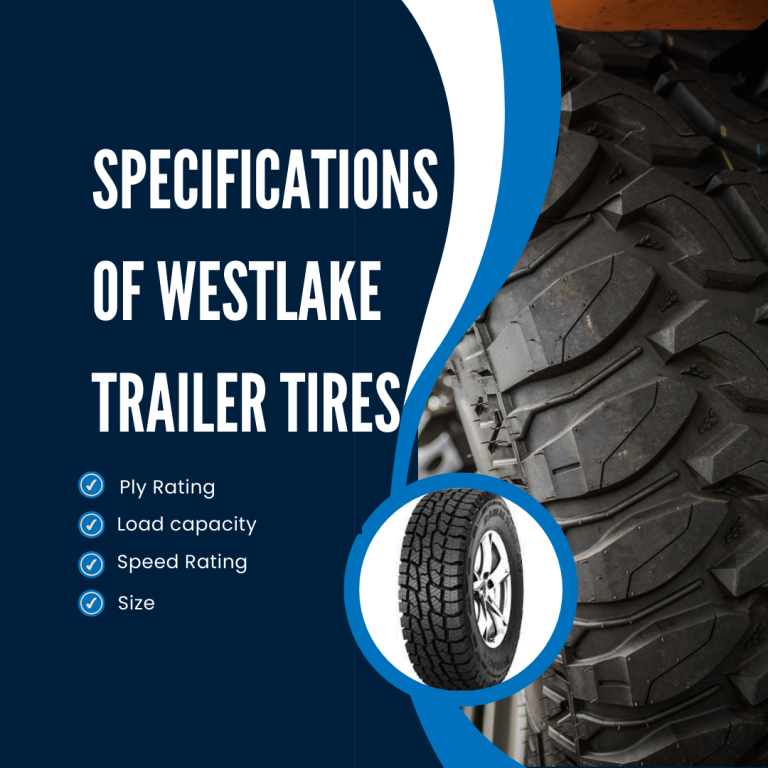
Specifications Of Westlake Trailer Tires Comprehensive Guide
When you need to pull something with your vehicle, choosing the right tires is very important. Westlake Trailer Tires,…
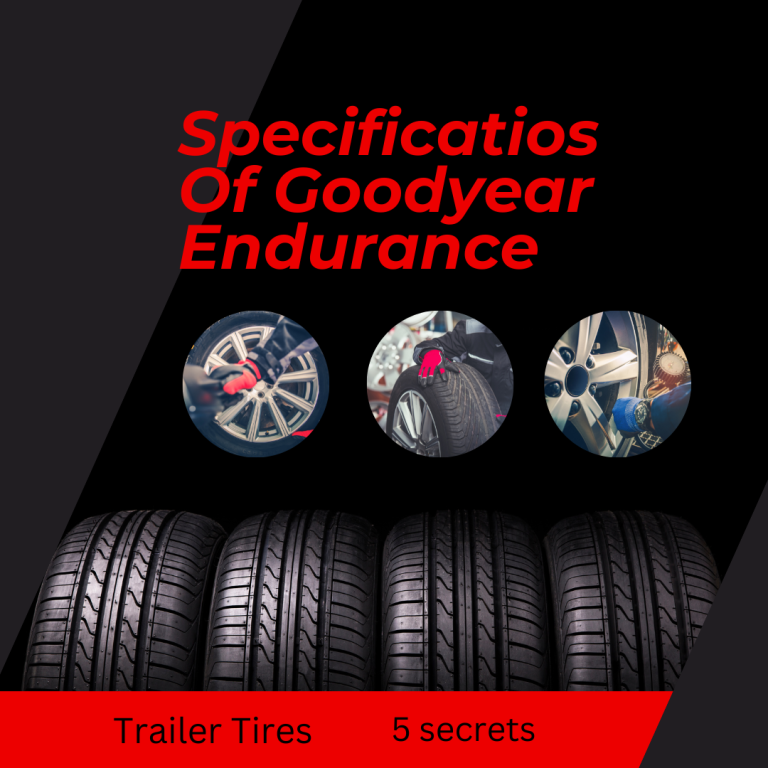
Specifications Of Goodyear Endurance |Trailer Tires| 5 Secrets
When we buy tires, we look into their details to make sure they work well and last long. Today,…
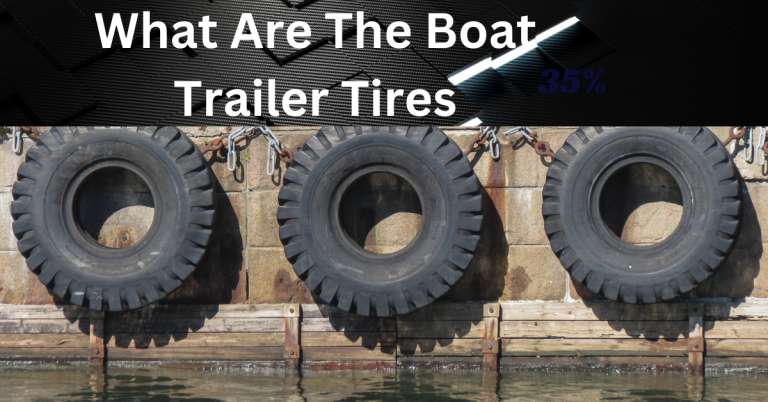
What are the Boat Trailer Tires?8 Comprehensive Things
Have You Ever wondered, “What are the boat trailer tires?” Well, as someone who’s passionate about boating, I’ve dived…
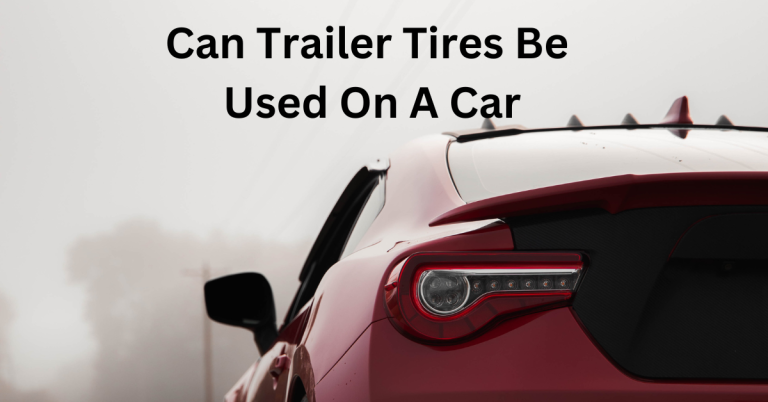
Can Trailer Tires be used on a Car? 4 Difference you should know
Last summer, I faced a dilemma. My car needed new tires, and I had a spare set of trailer…

Should You Rotate The Tires On Your Travel Trailer?
by Glynn Willard | May 6, 2023 | Fulltime RV Living | 0 comments
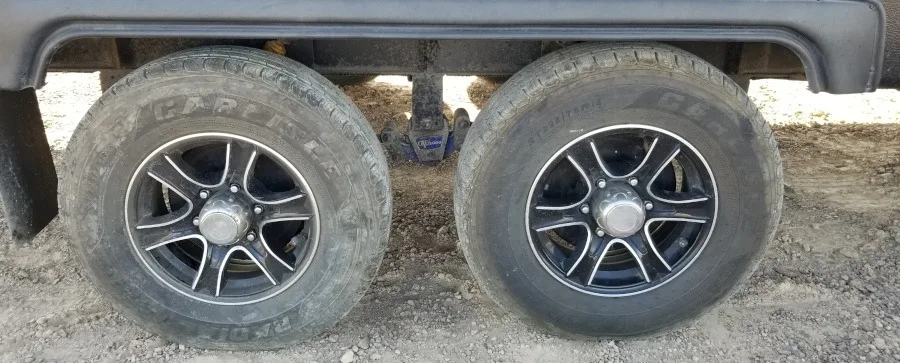
Last Updated on 04/07/2024 by Glynn Willard
Your Blog Post with Divi-Style Box
Should You Rotate Tires On Your Travel Trailer?
Ultimately, yes, it’s a good idea to rotate the tires on a travel trailer.
Rotating your tires on your travel trailer might be controversial and in some cases unnecessary.
But after towing a travel trailer all over the country for over 35,000 miles, I’ve made a few observations.
First and foremost, tire and wheel care on your travel trailer should be every RV owners number one priority for the sake of safety.
So again, some will say tire rotation is not necessary. Let’s see if it is for your situation.
For the duration of this article, I’ll be discussing tire rotation on dual axle travel trailers, but it still applies to a fifth wheel.
Why Rotate The Tires On A Travel Trailer?
It doesn’t take much in the way of axle alignment and your suspension system to have one or more tires with uneven wear.
Some of the misalignments might be negligible and take a while to present themselves.
You can counter this through regular rotation of your tires so that all tires can wear evenly.
Of course, if there’s a lot of tire wear on one tire in particular, it’s time to take additional measures.
We did an entire video about checking your wheel alignment and changing the bushings and shackles.
Check out the article:
Uneven Tire Wear On Your Travel Trailer. Is It A Bent Axle?
Or watch the video 🙂
How Often Should I Rotate My Trailer Tires?
I never went with a quantified schedule. I’ve read everything from every 3000-6000 miles.
That’s quite a spread! So, I just watched for wear patterns and rotated them spontaneously.
I found it good practice to do regular tire inspections to watch for the tiniest bit of wear and then rotate.
It was part of my constant maintenance of checking the bearings, brakes, lug nut torque, and suspension.
Overkill? No way! That was my house with everything we needed to live off-grid for my family. Definitely not overkill.
Besides, I learned the hard way after one of our wheels fell off to always do proper preventive maintenance.
And yes, I did a lot of this maintenance right on BLM land with no issues. I also never left a mess or disrupted the land in any way.
I write that in the past tense because we have since sold the trailer and purchased a Roadtrek Zion campervan .
What’s The Rotation Pattern For Travel Trailer Tires?
Again, I’m only discussing rotating tires on duel axle travel trailers.
But, if you have a single-axle trailer, rotate side-to-side since the direction of rotation is likely not an issue.
It always made the most sense to move the front tires to the back and form an X pattern (criss cross) for the rear tires to the front.
In other words, front to back on the same side. Then rear passenger moves to the front driver and the opposite for the opposite side.
This has been standard in the automotive industry on passenger vehicles for decades.
If for some reason you have directional tires, swapping the same side from the front axle to the rear axle will be necessary.
Should you rotate your spare tire into the mix?
This is debatable and opinion-based.
I kept my spare out of the mix to make sure it was worthy in case of an emergency.
If your spare tire has the same tire and aluminum wheels as the other wheels it’s fine to rotate it into the mix.
Lastly, make sure you rotate the tires on your tow vehicle too. The rear tires bear a heavy load and should be rotated regularly.
Craving Video? Visit Our Channel
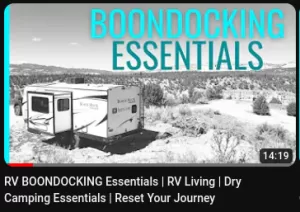
Why Not Rotate RV Tires?
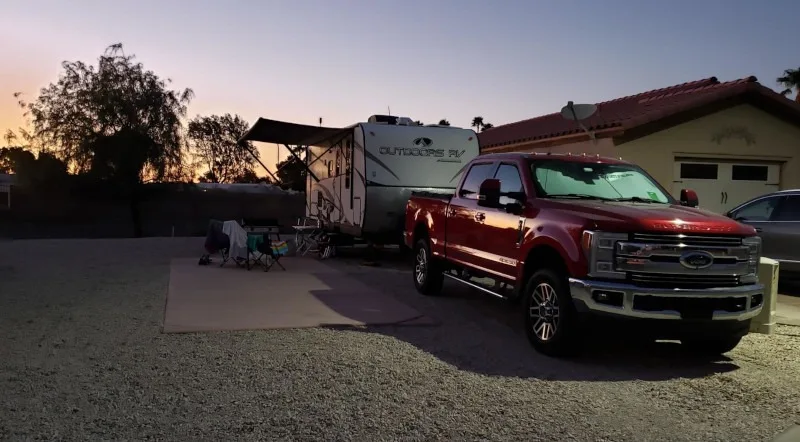
If you move very infrequently with low mileage, it’s not necessary.
Your tires will likely rot from sun exposure if uncovered or develop flat spots before they present tread wear from road use.
But really, this article is for those of you who move/travel frequently or live full-time in your travel trailer.
Should You Balance The Tires On Your Travel Trailer?
When I first purchased my travel trailer, I never thought about this. Then I had a fleeting thought.
Do travel trailer tires need to be balanced? I thought about the physics and the answer was a no-brainer.
After speaking with many specialists, my conclusion that you should balance your trailer tires if you have dual axles was correct.
It minimizes the jarring on your suspension and equates to a smoother ride.
Besides, balancing the travel trailer tires costs so little at a local tire shop, it’s cheap insurance.
Therefore, based on my experience, yes you should balance travel trailer tires.
Premature Wear On Your Trailer Tires
There are a few potential contributing factors that can cause one of the tires on your travel trailer to present unusual wear.
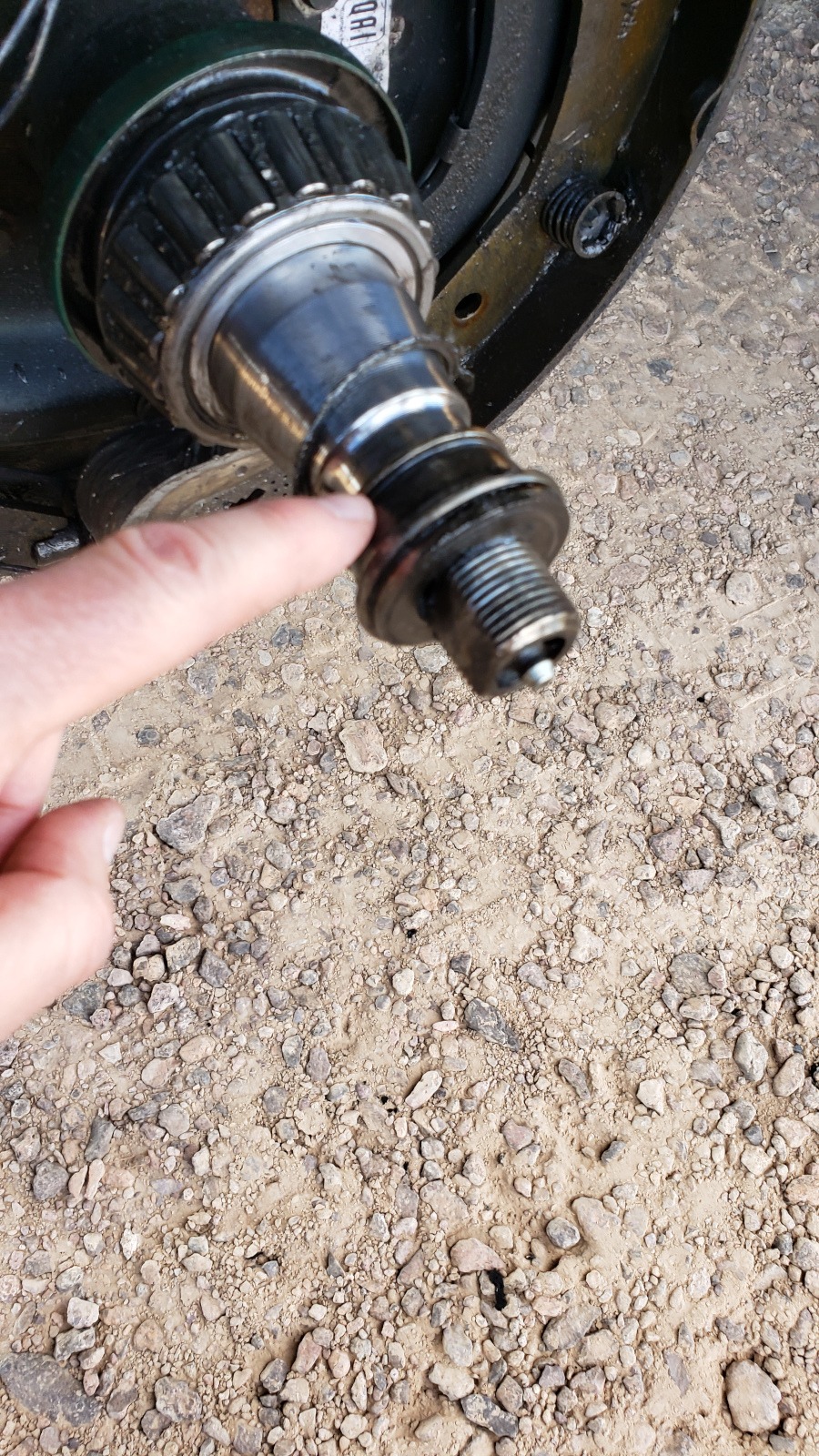
The outer bearing race was almost welded to the spindle.
- Axle Alignment: What this means is that there’s a small discrepancy in the axle spindle. It can be corrected professionally.
- Worn bushings and shackles: This was my issue. Replacing all the components took care of 90% of the problem.
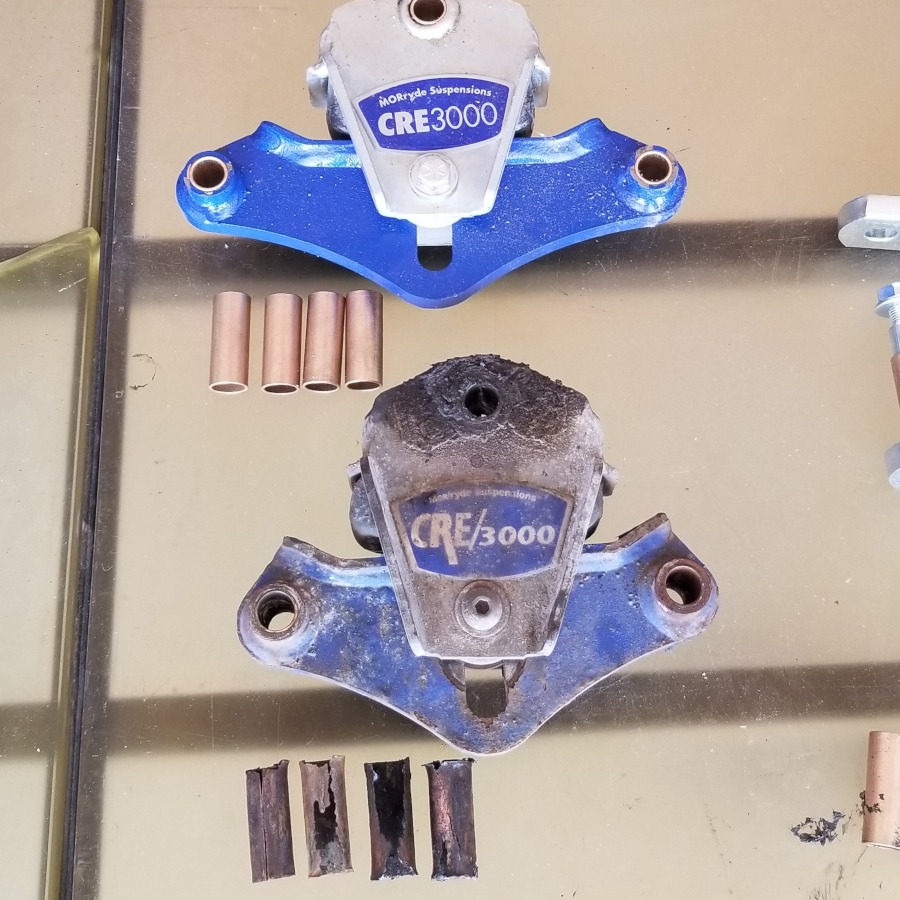
The new and the old MorRyde CRE3000.
- Tire Pressure: If you don’t maintain the correct pressure in each tire for the weight of the trailer, there can be uneven wearing. You should be carrying an air compressor in your trailer or tow vehicle.
- Weight: Overpacking your trailer above the load capacity of the tires can cause premature and irregular wearing of your tires.
- Terrain: The more pavement your tires see, the faster the wear. Also, if you do a lot of off-roading in rocky environments, this can contribute. But a lot of dirt roads have minimal impact.
Again, we cover many of these factors in our article Uneven Tire Wear On Your Travel Trailer? It’s Not What We Expected .
Do I Need All Terrain Tires On My Travel Trailer?
An all-terrain tire is designed to grip and propel you in loose terrain.
Trailer tires are not self-propelled. They just lazily roll along.
Therefore, mount a tire that will give the smoothest roll on any surface.
That’s a standard highway tire made for channeling water at high speeds.
If you plan on towing through difficult, rocky terrain that includes sharp rocks on the side of the tires, an off-road tire designed for overlanding will be advantageous.
Otherwise, a standard set of tires for a trailer or truck will be fine.
Not Sure What You Need For Your RV?
Things That You’ll Actually Use In Your RV
Essential Tools You Should Have For Any RV
Essentials For Boondocking
Other Considerations For Travel Trailer Tires And Wheels
Each one of these topics requires its own article. All are of the utmost importance for your and other’s safety.

- Proper maintenance of bearings . Please take the time to do it yourself or have the bearings regreased by hand.
- Grease the wet bolts on your shackles and suspension system (without weight on the axle).
- Learn the proper torque for your lug nuts and check every second move with a well-calibrated torque wrench.
- When buying new tires, make sure the manufacturing date is recent.
- A good quality tire manufacturer is crucial. Bad tires are a real hazard on the road.
- Learn proper tire maintenance and stick with it.
As you can see, there’s a lot more to maintaining your trailer tires for a travel trailer than just tire rotation.
And I can comfortably make that statement since I was also in the dark about trailer tires when I first started full timing.
I hope this article helped if you’re about to purchase a travel trailer or just bought one.
Do you rotate your travel trailer’s tires? Meet the author. We appreciate any help in bringing you great content. Donate or buy us a coffee on our Ko-Fi site . Or subscribe to our YouTube Channel .

Submit a Comment Cancel reply
Your email address will not be published. Required fields are marked *
Save my name, email, and website in this browser for the next time I comment.
Recent Posts
- Can RV Owners Expense Their RV As A Tax Business Deduction?
- Your Checklist For Buying A New Travel Trailer (RV)
- Best Full-Time Camper Vans For Living In | Guide
- What Are The Best Type Of RVs For Boondocking (Dry Camping)
- Choosing The Best Fridge For Campervan Life | Considerations

How to Properly Load and Balance Your Travel Trailer
Properly loading and balancing your travel trailer is crucial for a safe and enjoyable camping experience. In this blog post, we’ll discuss essential tips and techniques for achieving optimal weight distribution and balance in your travel trailer.
Table of Contents
Understanding the Importance of Weight Distribution in Travel Trailer Safety
Weight distribution plays a significant role in travel trailer safety. Proper weight distribution:
- Improves handling and stability
- Reduces sway and stress on the tow vehicle
- Prevents overloading of tires, suspension, and axles
- Enhances fuel efficiency
- Minimizes the risk of accidents and trailer damage
To ensure a safe and smooth ride, always follow the recommended loading guidelines provided by your travel trailer’s manufacturer.
The Role of Tongue Weight in Maintaining Travel Trailer Balance
Tongue weight is the downward force exerted on the hitch by the trailer. Proper tongue weight is essential for maintaining travel trailer balance and preventing sway. The ideal tongue weight should be:
- Between 10% and 15% of the travel trailer’s gross weight
- Within the tow vehicle’s hitch weight capacity
Regularly measure and adjust your travel trailer’s tongue weight to maintain optimal balance.
How to Use a Weight Distribution Hitch for Optimal Travel Trailer Stability
A weight distribution hitch (Amazon) can significantly improve travel trailer stability by distributing the trailer’s weight evenly across the tow vehicle’s axles. To use a weight distribution hitch:
- Select a hitch with a weight capacity that matches your trailer’s loaded weight.
- Follow the manufacturer’s installation and adjustment instructions.
- Regularly inspect and maintain the hitch components for optimal performance.
The Impact of Proper Travel Trailer Loading on Fuel Efficiency
Properly loading your travel trailer can improve fuel efficiency by:
- Reducing aerodynamic drag
- Minimizing unnecessary weight
- Ensuring optimal weight distribution
To optimize fuel efficiency, avoid overloading your travel trailer and distribute the weight evenly throughout the interior.
Guidelines for Determining Your Travel Trailer’s Gross Vehicle Weight Rating (GVWR)
The Gross Vehicle Weight Rating (GVWR) is the maximum weight your travel trailer can safely carry, including the trailer’s weight and all cargo. To determine your travel trailer’s GVWR:
- Refer to the manufacturer’s specifications in your owner’s manual.
- Use a trailer weight scale to measure the loaded weight of your trailer.
- Ensure the loaded weight does not exceed the GVWR to maintain safety and prevent overloading.
Take a look at our article on: What Size Truck Do I Need To Pull A Travel Trailer? A Guide To Safe Towing
Tips for Packing Your Travel Trailer: Even Weight Distribution and Organization
When packing your travel trailer, follow these tips for even weight distribution and organization:
- Place heavy items low and near the trailer’s axle(s).
- Distribute weight evenly on both sides of the trailer.
- Secure items to prevent shifting during travel.
- Organize items by frequency of use, with frequently used items easily accessible.
- Use storage containers to keep small items organized and in place.
How to Measure and Adjust Travel Trailer Tongue Weight
To measure and adjust your travel trailer’s tongue weight:
- Use a tongue weight scale or a bathroom scale with a support structure.
- Park the travel trailer and tow vehicle on a level surface.
- Lower the trailer’s coupler onto the scale and record the weight.
- If necessary, adjust the weight by redistributing cargo or using a weight distribution hitch.
The Role of Travel Trailer Axle Position in Weight Distribution and Balance
The position of the travel trailer’s axle(s) plays a crucial role in weight distribution and balance. Proper axle positioning:
- Ensures even weight distribution across the tires
- Reduces stress on the trailer’s frame
To maintain optimal balance, ensure your travel trailer’s axle(s) are positioned correctly according to the manufacturer’s guidelines.
Using Leveling Blocks and Chocks for Travel Trailer Stability
Leveling blocks and chocks are essential for stabilizing your travel trailer when parked. To use them:
- Park the travel trailer on a flat, solid surface.
- Place leveling blocks under the tires on the low side of the trailer.
- Adjust the number of blocks until the trailer is level.
- Secure the tires with chocks to prevent rolling.
Using leveling blocks and chocks will enhance your travel trailer’s stability and overall safety.
You may be interested in this article: Best Leveling Blocks For Travel Trailers And RVs
The Benefits of a Sway Control System for Travel Trailer Balance
A sway control system helps minimize trailer sway and maintain balance during travel. Benefits of a sway control system include:
- Improved handling and stability
- Reduced stress on the tow vehicle’s hitch
- Enhanced safety and reduced risk of accidents
Consider investing in a sway control system for a more balanced and enjoyable towing experience.
Travel Trailer Loading: Addressing Side-to-Side and Front-to-Rear Balance
Maintaining both side-to-side and front-to-rear balance is crucial for travel trailer stability. To achieve proper balance:
- Position heavy items low and close to the axle(s).
- Maintain proper tongue weight (10-15% of the trailer’s gross weight).
Regularly check and adjust your travel trailer’s balance for optimal safety and performance.
Travel Trailer Loading Best Practices for Specific Items (Bikes, Kayaks, etc.)
When loading large or oddly-shaped items like bikes or kayaks, follow these best practices:
- Use specialized racks or mounts designed for your travel trailer and the items you’re transporting.
- Position items low and close to the trailer’s axle(s) when possible.
- Secure items to prevent shifting or damage during travel.
- Adjust the trailer’s weight distribution as needed to maintain proper balance.
The Impact of Water and Waste Tank Levels on Travel Trailer Balance
Water and waste tank levels can significantly impact travel trailer balance due to their weight. To maintain optimal balance:
- Empty waste tanks before traveling.
- Fill water tanks only as needed, and consider traveling with partially filled tanks to reduce weight.
- Adjust the trailer’s weight distribution as necessary when tanks are full or empty.
By monitoring and managing your travel trailer’s tank levels, you can maintain proper balance and enhance safety during your journey.
By following these guidelines for properly loading and balancing your travel trailer, you can ensure a safe and enjoyable camping experience. Remember to always consult your travel trailer’s owner’s manual for specific recommendations and guidelines related to your particular model.
Good luck, and happy camping!
Take a look at our article on: Best Weight Distribution Hitch For (Safe Proper Towing)
Please keep in mind that we may receive commissions when you click our links and make purchases. However, this does not impact our reviews and comparisons. We try our best to keep things fair and balanced, in order to help you make the best choice for you.
As an Amazon Associate, I earn from qualifying purchases.


IMAGES
VIDEO
COMMENTS
The answer is yes, you should. Although you may meet RVers and travel trailer owners who disagree, balancing your travel trailer tires is actually necessary for improved performance, tire longevity, and safety factors. Passenger vehicle tires need to be balanced for ride stability and comfort, as well as for function.
Besides tire wear issues, out-of-balance tires can also negatively impact the axle spindle, wheel bearings, and suspension components on your trailer. Damaged spindles or bearings can lead to too often tragic wheels coming off your chariot. Finally, shake and vibration will be transmitted into the coach itself.
Yes, utility trailers should have their tires balanced for optimal performance. Just like other types of trailers, balancing the tires on a utility trailer can help prevent uneven tire wear, maintain stability, and protect the trailer's suspension components, ensuring a smooth and safe towing experience. When tire shopping for your travel ...
The short and sweet answer: Work 'em, then wrap em'. The "DIY guy" answer: There are some measures you can take to keep your trailer tires healthy and strong. Dry rot is caused by excessive heat and sun, lack of use, and low inflation. Use a wheel cover when your trailer is not in use to guard against UV rays, water, and dirt.
Yes, routine trailer tire balancing is recommended. For most trailer users, experts suggest balancing tires every 10,000 to 12,000 miles or once a year, whichever comes first. However, this can vary based on tire condition and specific usage patterns. Always monitor tires for uneven wear as an indication.
In Beach's view, a balanced tire is one that runs cooler and smoother, and will have a far greater lifetime than an unbalanced one. "It's money in the bank," Beach told us. But are all tire shops ready to balance your trailer's "rubber donuts"? That depends. Some trailer wheels are not designed like the typical car or truck wheel ...
If you have a 15″ tire or smaller and need more than 3 oz. to balance, or if you have a 16″ or 17″ tire and need more than 5 oz., or have a 19.5″ or 22.5″ tire and need more than 7 oz. of weight, I would suggest that there may be a problem and that it needs to be discovered and "fixed". A final comment on balancing.
3 Ways to Balance Your Trailer Tires. Tire balancing ensures that all your trailer wheels are moving at the same speed. The good news is that you can balance your trailer tires through relatively simple methods. Mechanical Triangle Spinning. Mechanical triangle spinning is a suitable way to help balance your trailer tires. This method includes ...
They feel that balancing trailer tires is a waste of time and money. However, if they practice the idea that 'the customer is always right' and the customer is paying for the balancing, then they should balance them for you. In some owners' minds, you do not need to balance your trailer tires, if it is not going to be on the road very often.
This is when your tire becomes oval-shaped. It can be corrected by rotating the tire 180 degrees on the wheel. Balancing your RV travel trailer tires is not necessary, but it is good practice. An unbalanced travel trailer tire can cause catastrophic damage to your road journey, leaving you stranded on the side of the road or in a remote area.
Balancing your travel trailer's tires isn't complicated but does require some basic tools and knowledge about how the process works. You'll need a few items such as a jack stand, wheel weights, tire pressure gauge, torque wrench and an appropriate balancing machine (if available). The first step is jacking up the vehicle so that all four ...
But even if your tires have plenty of tread left, keeping them for more than 8-10 years is not recommended. Most RV and travel trailer tires should be replaced every 10,000 to 15,000 miles. But each manufacturer recommends a service life for their tires, so it's best to seek their advice on tire replacement intervals.
A well-balanced tire will provide the least rolling resistance and potential fuel savings. For these three reasons, 1) premature tread wear, 2) premature trailer component wear, and 3) increased rolling resistance, we strongly encourage all trailer owners to balance their trailer tires. At Boar, we balance internally using balancing beads.
Here is our course on inspecting new and used travel trailers: https://thesavvycampers.com/inspectioncourse/In this video we go over the reasons that your tr...
In general, travel trailer tires should be replaced every 5-6 years, with close inspection every year before and after each camping season. ... Weights and balance, it'll have a direct relationship on load per tire and should improper tire air pressure be out of specs at the time you'll have the receipe for potential problems some of ...
7. Got a fifth-wheel or travel trailer? Then your "towable" RV has tires on the ground. If you check your tire pressure regularly, and don't overload your rig, you're ahead of the game. But, strangely enough, even among veteran towable owners there is something about tires often neglected: balance. Few people would drive their car or ...
In this guide, we have compiled a list of eight of the very best travel trailer tires on the market today, and included a useful buying guide to help you make the right choice. Table of Contents. 1 Best Travel Trailer Tires. 1.1 Carlisle Radial Trail HD Trailer Tire. 1.2 Maxxis M8008 ST Radial Trailer Tire.
RV and motorhome tires should be balanced when they are replaced and checked frequently for uneven wear. RV experts generally agree that RV and trailer tires are unlikely to see enough miles to need to be rotated. However, you can rotate them when you see uneven wear or about 8,000 miles. Some very diligent RVers inspect and rotate their ...
2.Getting the Right Equipment. For balancing your trailer tires, you will need a tire balancer. This tool helps identify which part of the tire is heavier or lighter by spinning the tire and wheel. Based on this, you can adjust the weight distribution. Tire balancers are available at automotive shops or online.
At the time, I was told because trailer tires usually don't stay balanced and they usually don't come from the factory balanced. I know very little about tires and expected a place that would make money on balancing tires to tell me what is needed. 12-15-2021, 01:22 PM. # 8. BehindBars. Senior Member.
Besides, balancing the travel trailer tires costs so little at a local tire shop, it's cheap insurance. Therefore, based on my experience, yes you should balance travel trailer tires. Premature Wear On Your Trailer Tires There are a few potential contributing factors that can cause one of the tires on your travel trailer to present unusual wear.
Out-of-balance tires tend to. To get optimum tire performance from your RV tires, the weight of the tire and wheel assembly must be balanced. Sunday, May 5, 2024. RVtravel.com Newsletter News, information and ... Should you balance your travel trailer tires? ##RVDT2165. RV Travel.
To achieve proper balance: Distribute weight evenly on both sides of the trailer. Position heavy items low and close to the axle (s). Maintain proper tongue weight (10-15% of the trailer's gross weight). Regularly check and adjust your travel trailer's balance for optimal safety and performance.